NOTICIAS DE LA COMUNIDAD LATINA EN INGLÉS Y ESPAÑOL
SEPTEMBER 2024


CELEBRANDO SIOUXLAND: CELEBRACIÓN DE LA CULTURA, LA COMUNIDAD Y LA INCLUSIÓN













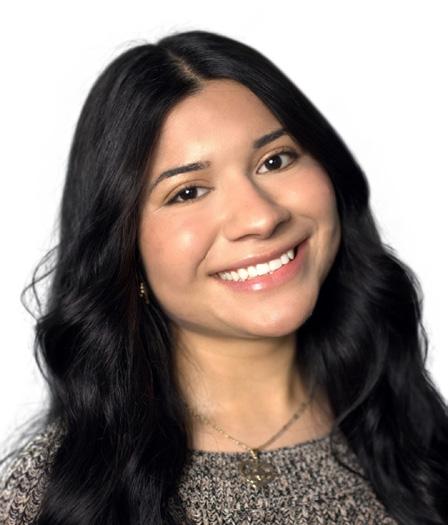




SEPTEMBER 2024


CELEBRANDO SIOUXLAND: CELEBRACIÓN DE LA CULTURA, LA COMUNIDAD Y LA INCLUSIÓN

















Por Ryan Magalhães, Des Moines Register
La Feria Estatal de Iowa fue testigo de un auténtico rodeo mexicano el domingo 11 de agosto por la tarde. Charros y Escaramuzas del centro de Iowa actuaron por primera vez en el recinto ferial, en el Elwell Family Park.
El espectáculo fue una demostración de un deporte conocido como Charrería, que se compone de 10 eventos llamados Charreada. Sin embargo, debido a ciertas limitaciones, sólo se mostraron cinco eventos, incluyendo baile, equitación y lazo.
“Actuar en la feria es increíble”, dijo Alejandra Piña, capitana de las Escaramuza Quetzalli. “La mayoría somos de Iowa, así que es la culminación de muchos sueños”.
La charrería es un deporte originario de México en el que los concursantes deben demostrar sus habilidades con el lazo y el control del caballo. Implica tanto espectáculo como una habilidad técnica cuidadosamente refinada. Aunque el espectáculo del domingo no era de carácter competitivo, Piña dijo que era una buena práctica.
“Las pistas son un poco más pequeñas”, dijo. “Y el terreno es muy diferente. Estamos acostumbrados a superficies blandas y arenosas”. La ayudante de Piña en el equipo, Anna García, dijo que ya se había torcido el tobillo una vez después de la primera exhibición.
El presidente de los clubes Charros de Iowa y locutor del evento, Juan Piña, dijo que estaban “haciendo historia mientras actuamos”. Los Charros llevan 16 años participando en el Desfile de la Feria Estatal, pero es la primera vez que actúan en el recinto. El espectáculo comenzó con una rutina de baile de Wendy Espinoza, que compartió el ruedo con un caballo que trotaba al ritmo de la música. Una banda en directo amenizó la mayor parte del espectáculo, añadiendo un toque mexicano más al evento.
Después de Espinoza, un charro solitario realizó una serie de maniobras técnicas que incluían múltiples giros de 360 grados seguidos. Algunas de las maniobras se realizaron incluso sin bocado, una herramienta que facilita mucho el control del caballo.
Uno de los momentos más destacados fue la impresionante demostración de habilidad con el lazo de Dariel Delgado, uno de los charros más jóvenes que actuaron. Delgado no sólo lazó a un caballo que iba a toda velocidad, sino que también realizó 40 saltos consecutivos con su lazo, un truco llamado Texas Skip.
El público disfrutó de varios bailes y espectáculos más antes de que el evento llegara a su fin.
Piña dijo que esperaba que el espectáculo pudiera volver el año que viene. García se mostró de acuerdo, calificando el deporte y el espectáculo como una labor de amor.
“Es una forma fantástica de conectar con tus raíces”, afirmó.
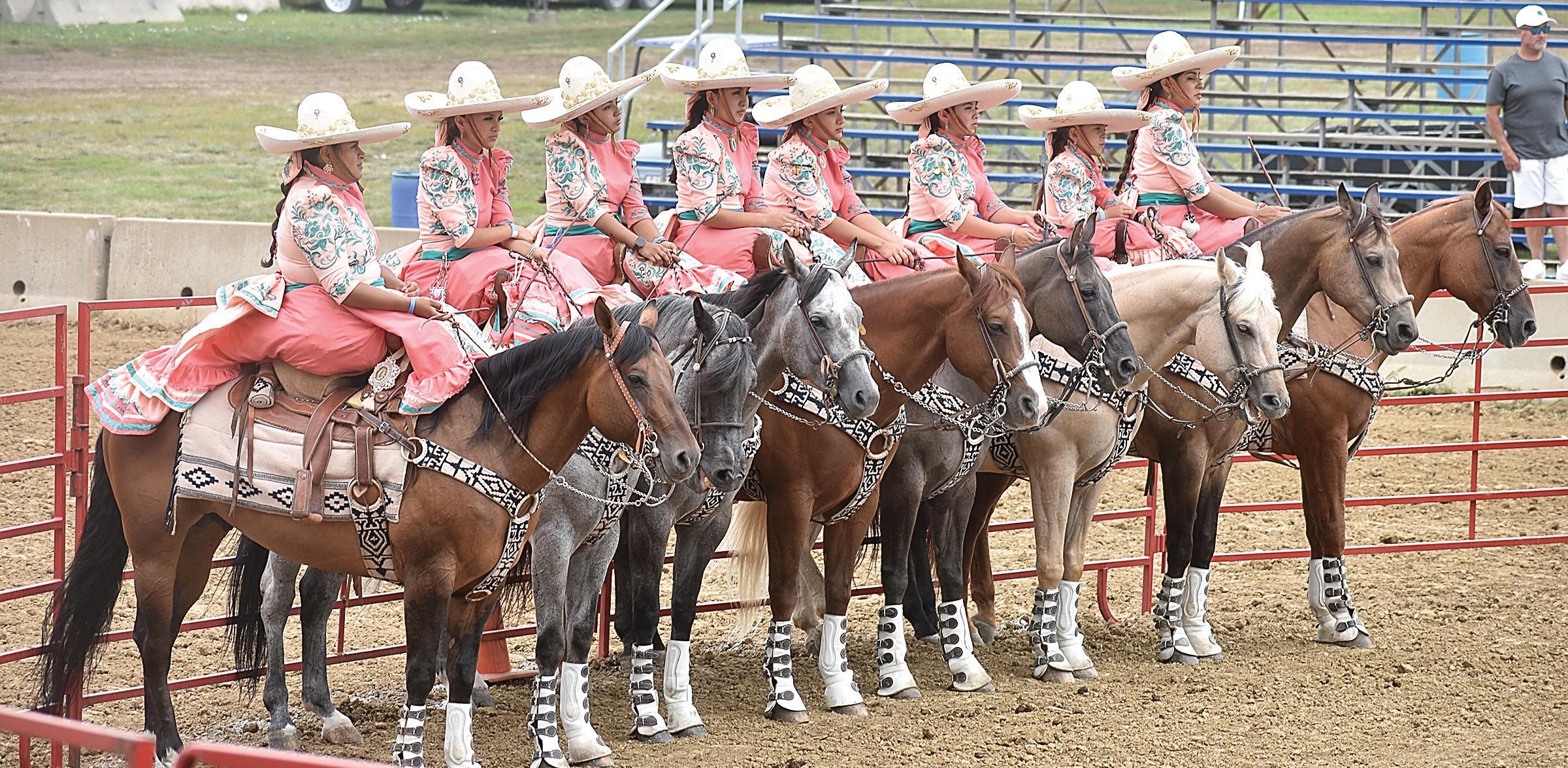
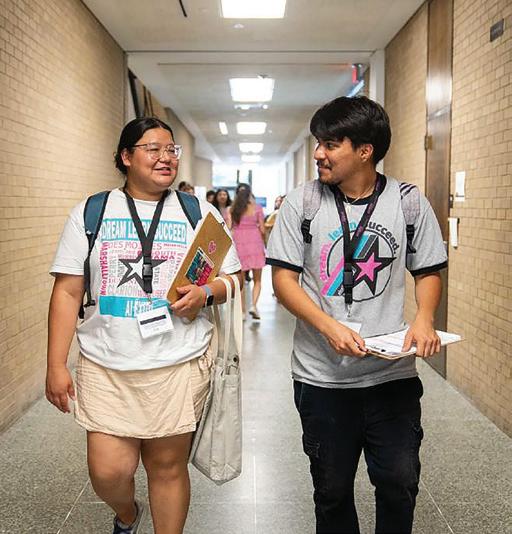
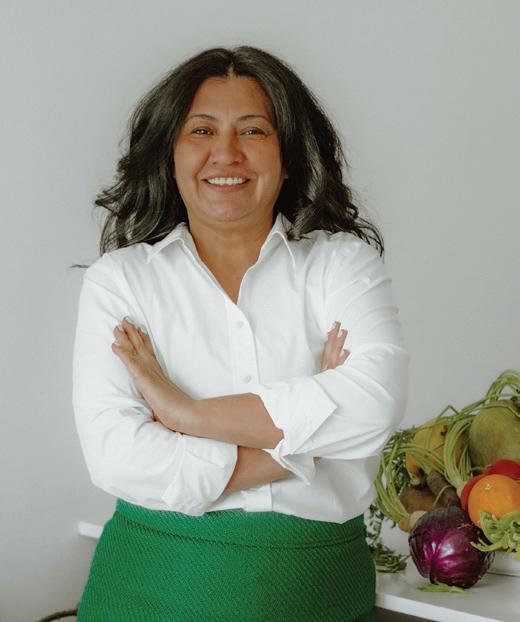


Sales & Marketing
Editor Christina Fernández-Morrow







Indalecio Macedo and his horse Duke dancing with Folkloric dancer Wendy Espinoza.
Iowa
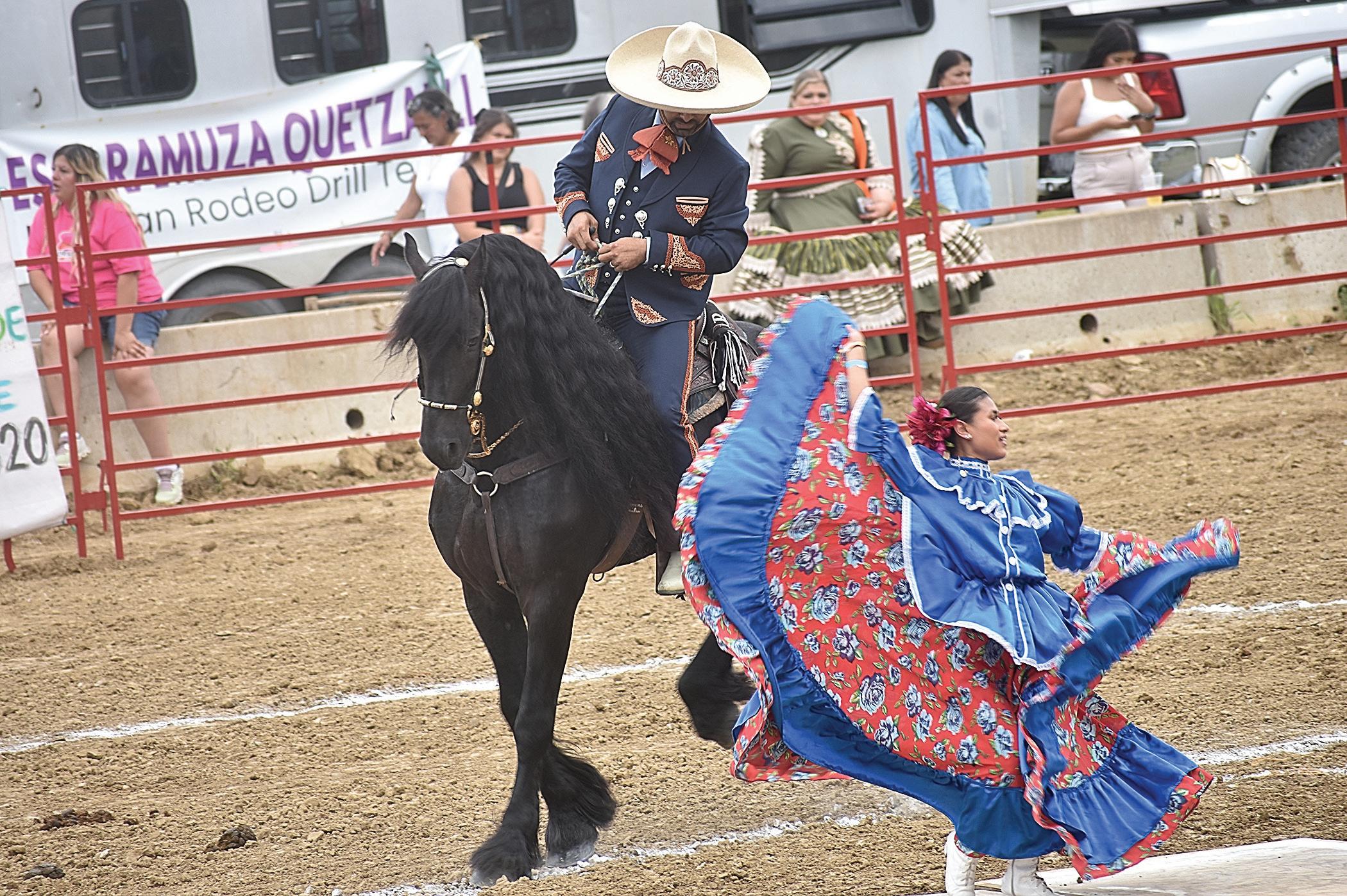
By Ryan Magalhães, Des Moines Register
The Iowa State Fair saw a slice of an authentic Mexican rodeo on Sunday, August 11th. Charros and Escaramuzas from central Iowa performed on the Fairgrounds for the first time at Elwell Family Park.
The show demonstrated a sport known as Charreria, which is composed of 10 events called Charreada. However due to certain limitations, only five events were displayed including dancing, horsemanship and roping.
“Performing at the fair is amazing,” Alejandra Piña, captain of the Escaramuza Quetzalli, said. “We’re mostly Iowans so it’s the culmination of a lot of dreams.”
Charros perform at the Elwell Family Park at the Iowa State Fair on Aug. 11, 2024. This is the first time this Mexican rodeo tradition has made an appearance at the fair.
Charreria as a sport orginates in Mexico and requires contestants to demonstrate skills with a lasso and control of their horse. It involves both showmanship and carefully refined technical skill. While Sunday’s show wasn’t competitive, Pina said it was good practice.
“The rings are a bit smaller,” she said. “And the ground is very different. We’re used to soft, sandy surfaces.” Piña’s assistant team coach, Anna Garcia, said she’d rolled her ankle once already after the first show.
President of the Charros clubs in Iowa and announcer at the event Juan Piña said they were “making history as we per-
form.” The Charros have been in the State Fair Parade for 16 years, but this is their first time performing on the grounds. The show started with a dance routine by Wendy Espinoza, who shared the ring with a horse that trotted around in time to the music. A live band was present to score most of the show, adding yet more Mexican flair to the event.
Charros perform at the Elwell Family Park at the Iowa State Fair on Aug. 11, 2024. This is the first time this Mexican rodeo tradition has made an appearance at the fair.
After Espinoza, a lone Charro performed a series of technical maneuvers including multiple 360 degree spins in a row. Some of the maneuvers were even performed without a bit, a tool that makes it much easier to control the horse.
One of the highlights was an impressive display of skill with a lasso by Dariel Delgado, one of the younger Charros who performed. Not only did Delgado lasso a horse that was at all full speed, but he also performed 40 consecutive jumps through his lasso, a trick called the Texas Skip.
The crowd was treated to several more dances and shows before the event came to an end.
Piña said he hoped the show would be able to come back next year. Garcia agreed, calling the sport and show a labor of love.
“It’s a really fantastic way to connect with your roots,” she said.
The Escaramuza teams that performed can be found on Facebook.

manteniéndonos al día con las pruebas de detección recomendadas.
Estas pruebas ayudan a detectar enfermedades y afecciones crónicas antes de que aparezcan los síntomas. El CDC recomienda lo siguiente:
Todas las personas de 13 a 64 años deben someterse a pruebas de detección del VIH al menos una vez en la vida.
Todas las personas mayores de 18 años deben someterse a pruebas de detección de la hepatitis B al menos una vez en la vida.
Todas las personas mayores de 18 años deben someterse a pruebas de detección de la hepatitis C al menos una vez en la vida.
Las mujeres embarazadas deben someterse a pruebas de detección del VIH, de la hepatitis B y de la hepatitis C durante cada embarazo.
Hable con su médico para que le haga las pruebas. ¿Ha olvidado si se ha sometido a una?
Pídale que compruebe sus antecedentes.
Las pruebas de detección son importantes porque el VIH, la hepatitis B y la hepatitis C no siempre presentan signos o síntomas perceptibles. Algunas personas deberían someterse a pruebas más a menudo: visite los siguientes recursos web para obtener más información.

Escanee aquí para obtener información sobre la detección del VIH.
O visite: https://cdc.gov/hiv/testing/


Escanee aquí para obtener información sobre la detección de la hepatitis B.

Escanee aquí para obtener información sobre la detección de la hepatitis C.
O visite: https://cdc.gov/hepatitis-b/testing/ O visite: https://cdc.gov/hepatitis-c/testing/




Por F. Amanda Tugade, Des Moines Register
Parte de una serie con motivo del 175 aniversario del Des Moines Register que examina la demografía pasada y futura de Iowa.
Gabby Guerra estaba de pie junto a la entrada de Jewett Hall en una reciente tarde de domingo, saludando a las docenas de familias latinas que vinieron de todo Iowa al campus de la Universidad Drake. Ni siquiera el intenso calor pudo con la alegre voz de Guerra y su gran
sonrisa mientras daba la bienvenida a padres y estudiantes armados con bolsas de lona, maletas, mantas y almohadas.
“Pasen, pasen”, dijo Guerra en español, dirigiendo a los grupos al vestíbulo, donde conocieron a sus colegas de Al Éxito y a estudiantes de Drake que les entregaron obsequios antes de ayudarles a instalarse en los dormitorios.
El 14 de julio comenzó el primer día del campamento de verano anual de la organización sin fines de lucro, Al Éxito University, un evento gratuito de cuatro días dirigido a estudiantes latinos de bachillerato que están en camino de ser
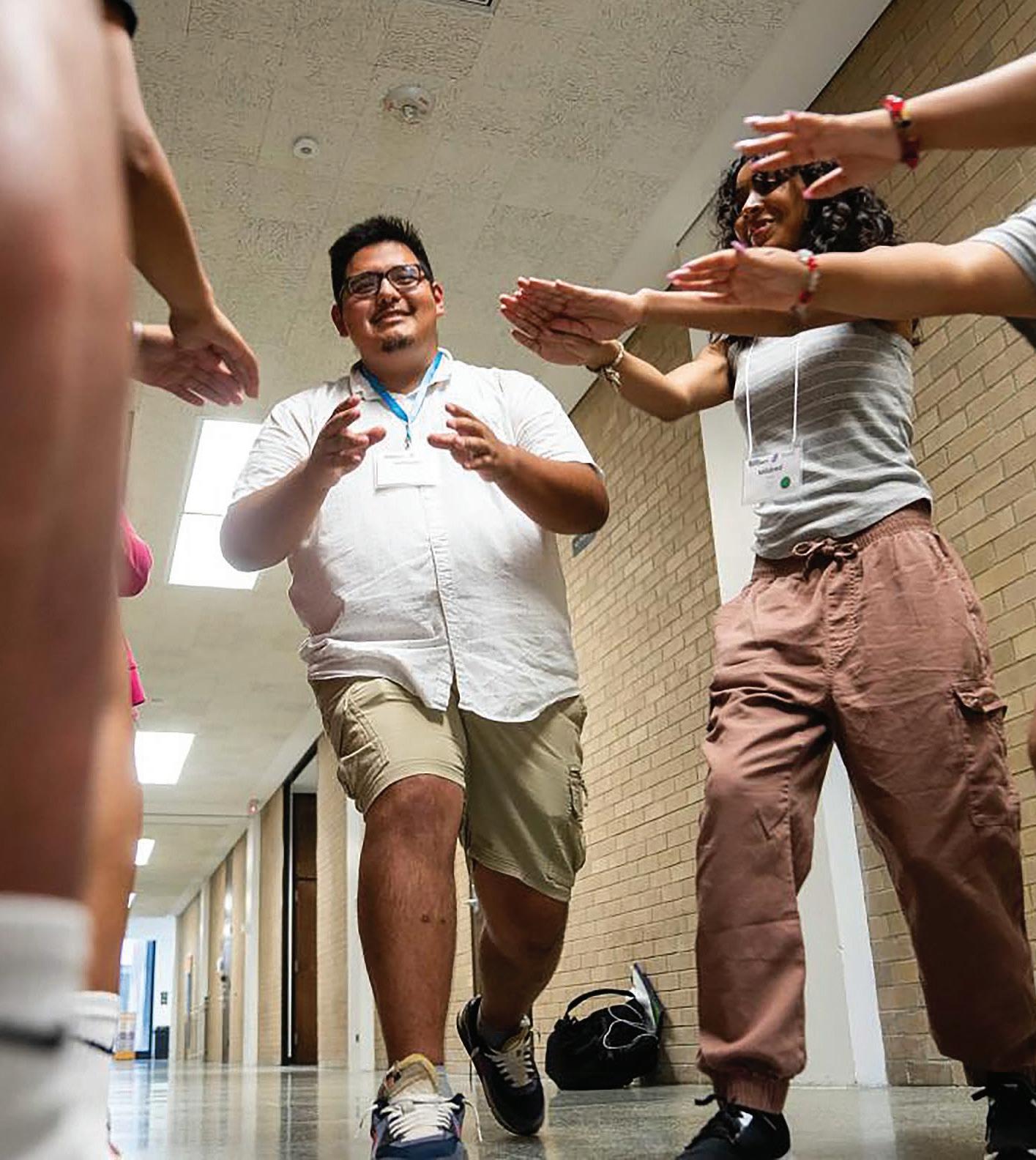
los primeros de sus familias en asistir a la universidad. Los padres asistieron ese día a talleres bilingües con sus hijos adolescentes para aprender más sobre la solicitud de la universidad y la ayuda financiera, la creación de un sistema de apoyo y el trabajo con los profesores y consejeros para prepararse para los siguientes pasos.
La comunidad latina de Iowa es esencial para el crecimiento del estado: se ha multiplicado por más de 13 desde 1969 hasta alcanzar el 7% de la población de Iowa y se prevé que se duplique con creces hasta alcanzar las 408,000 personas en 2050, según el Proyecto Latinx de Iowa. También es el más joven de los grupos raciales o étnicos de Iowa, con una media de edad de 23.7 años, frente a los 41.5 de la población blanca.
Por eso la educación se ha convertido en un factor clave para programas como Al Éxito, uno de los pocos sin fines de lucro del estado que trabaja para capacitar a los latinos de Iowa a través de la educación, no sólo para que alcancen el éxito, sino también para reforzar la futura mano de obra de Iowa. También es la razón por la que los grupos comunitarios han luchado contra la más reciente ley de inmigración del estado, que convierte en delito la entrada en Iowa de cualquier persona con una orden de deportación pendiente o que previamente haya sido expulsada o se le haya denegado la admisión en Estados Unidos.
La ley, en suspensión después de que un juez federal concediera una medida cautelar en junio, puso en vilo a los inmigrantes de Iowa, encendiendo los temores sobre la elaboración de perfiles raciales. Los latinos de Des Moines, Waterloo y otras ciudades de Iowa se unieron en protesta este verano, tratando de sensibilizar sobre la ley de gran alcance que incluso los departamentos de policía encargados de hacerla cumplir criticaron. Vivir en Estados Unidos con incerti-
dumbre es un sentimiento que Guerra, directora de programas de Al Éxito, conoce bastante bien. Hace casi dos décadas, Guerra llegó a Estados Unidos desde El Salvador con sus padres, que querían que ella y sus hermanos tuvieran un futuro mejor.
Guerra dijo que ese viaje puede ser duro, solitario y aterrador, especialmente para aquellos que son estudiantes universitarios de primera generación.
El mensaje durante el acto de bienvenida a la Universidad Al Éxito recordaba al que surgió de las marchas de este verano: “No están solos”.
La Universidad Al Éxito quiere demostrar que los latinos son “fuertes” Antes de que las familias se dispersaran para recorrer el campus, Alejandro Hernández compartió lo que su padre le dijo después de convertirse en el primer decano latino en Drake: “No podemos ser menospreciados”. Hernández, que dirige el Zimpleman College of Business, dijo que entendía que eso significaba tener humildad y reconocer que el papel es más que un título.
“Somos increíblemente fuertes”, dijo a la multitud de más de 80 adolescentes y sus familias. “Tenemos mucho que aportar”.
En Iowa, los latinos representan alrededor del 7% -o 221,805- de la población del estado. Para 2060, se espera que la población latina de Iowa alcance casi los 518,000, según un informe del año pasado del Centro Estatal de Datos de Iowa. En 2022, el 75% de los latinos de Iowa mayores de 16 años formaban parte de la población activa, en comparación con el 67% de todos los habitantes de Iowa mayores de 16 años. Los trabajadores latinos ocuparon principalmente empleos en transporte, producción, negocios, administración y servicios, informó el centro de datos.
Los resultados recientes del Proyecto


Latinx de Iowa dicen que los latinos son propietarios de 4,695 empresas en el estado, y generan 1,000 millones de dólares en ingresos anuales. Y los 106,000 trabajadores latinos en Iowa ganan colectivamente 4,800 millones de dólares en ingresos anuales.
Pero ambos informes también destacan las disparidades, especialmente en educación. Mientras que el 93% de los ciudadanos de Iowa mayores de 25 años tienen al menos estudios de bachillerato, la cifra desciende al 70% entre los latinos, según el Centro de Datos del Estado. Y mientras que el 32% de los habitantes de Iowa mayores de 25 años tienen al menos una licenciatura, sólo el 16% de los latinos lo tienen. Los latinos siguen estando infrarrepresentados en las universidades.
La falta de recursos educativos y de programas bilingües para niños y padres son ejemplos de problemas que dificultan el éxito de los estudiantes, según el Proyecto Latinx.
Para Guerra y su colega Andrés Lomeli Cervantes, su trabajo a través de Al Éxito es personal, impulsado por su deseo de ayudar a la próxima generación de estudiantes. Ellos, junto con otros líderes del programa, conocen las barreras a las que se enfrentan los estudiantes y las familias inmigrantes para obtener una educación superior. El estatus migratorio, la falta de dinero, las dificultades lingüísticas y la ausencia de un sistema de apoyo son retos comunes que dificultan dar el siguiente paso, dicen.
“Me preguntaba cuál era mi lugar en la universidad, si pertenecía a ella”, contó Cervantes, de 19 años y estudiante de segundo curso en la Universidad del Norte de Iowa, sobre su primer año en la universidad. “Recuerdo estar sentado en mi dormitorio sintiéndome aislado y abrumado, pensando en todos los sacrificios que había hecho mi familia, en la presión. ... Y a menudo sentía todo el peso sobre mis hombros”.
Ese momento en su dormitorio fue sólo una parte de la historia. Antes de llegar a la UNI, dijo Cervantes, estaba en camino de recibir una beca completa para una institución en línea. Era la oportunidad de su vida para este nativo de Marshall-
town, que tenía tres trabajos para ahorrar para la universidad. Cervantes dijo que la oportunidad se cayó en el último minuto, pero encontró refugio en Al Éxito, especialmente en el Director Ejecutivo Dawn Martínez Oropeza, que lo apoyó y le ayudó a llegar a UNI.
Mientras Cervantes hablaba de su primer año, también señaló otros obstáculos como cambiar de carrera, adaptarse a vivir en un campus universitario y hacer nuevos amigos.
“La lucha no termina ahí”, dijo, animando a padres y estudiantes por igual a pedir ayuda, hacer preguntas y ser perseverantes.
Tienes una comunidad que cree en ti”, dice un empleado del programa.
Guerra, que se graduó en la Universidad de Iowa, recordó su preocupación por inscribirse en la Acción Diferida para los Llegados en la Infancia, también conocida como DACA, después de que el expresidente Barack Obama ampliara en 2014 el programa, que permite a los indocumentados que llegaron al país siendo niños seguir viviendo, trabajando y estudiando en Estados Unidos.
“Mi familia y yo estábamos realmente asustados de entrar en un programa”, dijo Guerra, de 28 años, al Des Moines Register. “Teníamos miedo de lo que eso podía significar ahora que nos hacíamos más visibles para el gobierno de Estados Unidos. Nos daba mucho miedo rellenar esa primera solicitud porque ahora tenían todo sobre ti, pero decidimos arriesgarnos”.
“Sentimos que si esto les iba a dar la oportunidad de ir a recibir una educación, entonces lo íbamos a hacer”.
Guerra tenía 7 años cuando ella y sus padres llegaron a Iowa en 2002 procedentes de El Salvador. Fue la primera de sus hermanos en llegar y aún recuerda cómo sus padres le explicaron su traslado de casi 3,000 millas.
“Me dijeron que venía aquí para recibir una educación”, cuenta Guerra. Dijo que ya entonces sabía que era indocumentada, pero se fijó el objetivo de ir bien en la escuela.
Antes de que los Guerra abandonaran su país de origen, sumido desde hacía tiempo en una guerra civil, éste se había vuel-
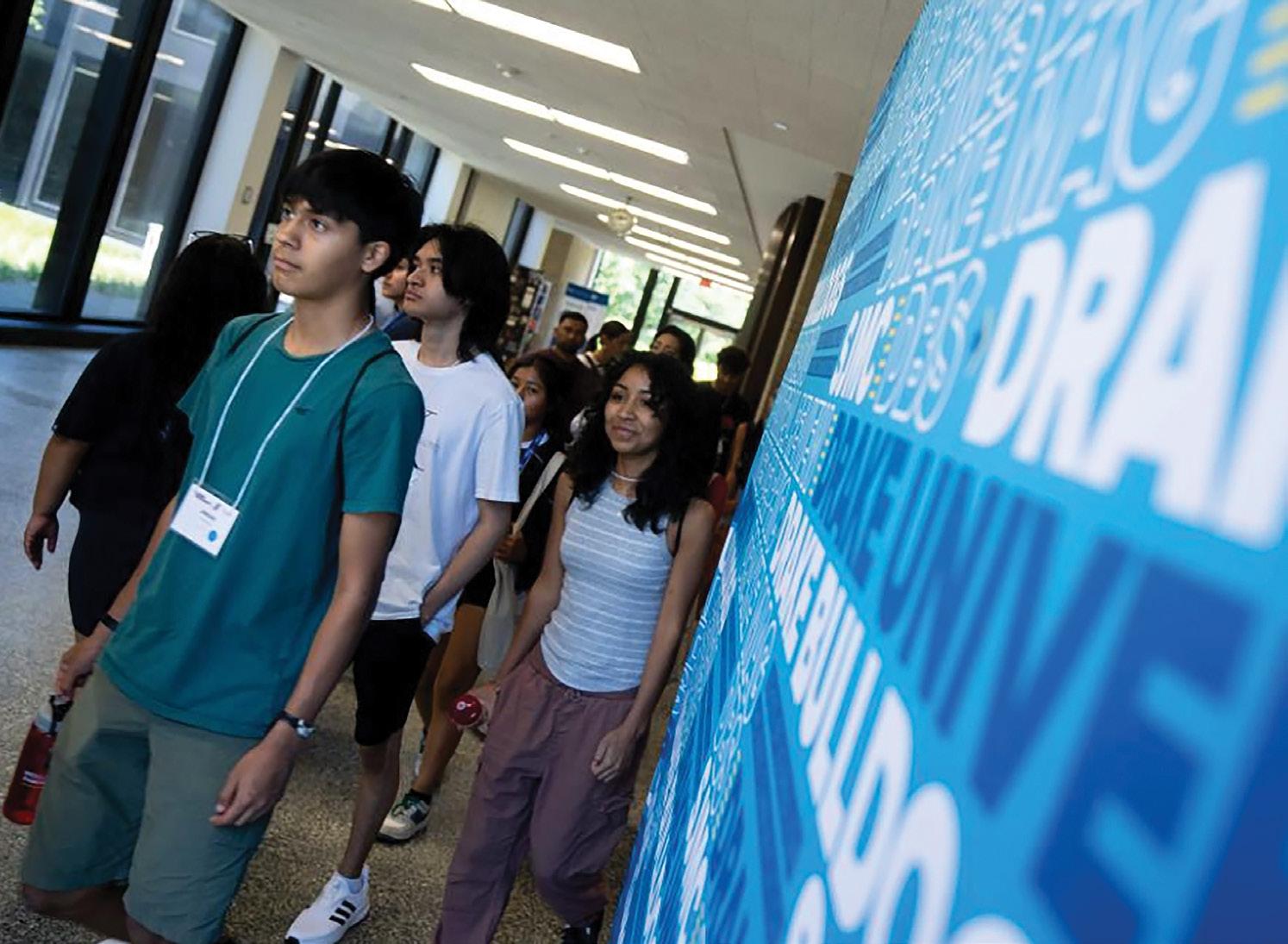
to cada vez más violento. Los índices de pobreza aumentaron y los puestos de trabajo y las oportunidades disminuyeron. Cuenta que su padre era un trabajador emigrante que iba y venía entre El Salvador y Estados Unidos, principalmente a California. Aceptó trabajos en fábricas y manufacturas y trabajó en restaurantes de comida rápida, “en realidad, cualquier cosa en aquella época”, dijo.
El padre de Guerra tenía un amigo que se estableció en Utah y un pariente que encontró un hogar en Iowa. Siguió el consejo del pariente, que veía Des Moines como un lugar seguro para las familias y con buenas escuelas. Cervantes dijo que sus padres también emigraron a EE.UU. desde México con la esperanza de que sus hijos recibieran una educación sólida.
En la escuela, Guerra era una estudiante sobresaliente y, en séptimo grado, formó parte de un programa acelerado en Central Academy. Ella creía, como muchos, que su duro trabajo daría sus frutos, pero más tarde en la escuela preparatoria, encontró que su estatus migratorio era una barrera para la universidad y otras oportunidades.
“Fue entonces cuando mis compañeros empezaron a conseguir trabajo, o prácticas, o experiencia profesional. Empezaron a conducir, y yo no podía hacer-
lo”, dijo Guerra, que fue a North High School. “No podía obtener la licencia. No podía conseguir un trabajo, así que no podía tener dinero adicional. El ser voluntaria, incluso cosas así, empecé a tener algunos problemas”.
Guerra dijo al Register que sorteó esos obstáculos apoyándose en los consejeros de la escuela preparatoria y los asesores universitarios para obtener ayuda, respuestas y orientación con el proceso de DACA.
“Estaba como yendo a ciegas y literalmente tocando todas las puertas posibles”, recordó. Ahora transmite a los estudiantes la lección que lleva de esa experiencia: “Tienes que ser la persona número 1 que mira por ti mismo”. De vuelta al auditorio, Cervantes siguió contando a las familias cómo fue su primer año. A la luz de los reflectores del escenario, les hizo un recorrido por los momentos difíciles que le habían llevado hasta allí y también les habló de las personas que creyeron en él y no le dejaron abandonar. En español y en inglés, Cervantes volvió a decir a los estudiantes que pueden y quieren.
“Quiero recordarles que no están solos”, dijo. “Tienen una comunidad que cree en ustedes y está comprometida con su éxito”.


The translation for this article is on page 22
Por Maya Chavez, Hola Iowa
El festival Celebrando Siouxland 2024, que tendrá lugar del 16 al 22 de septiembre, es una celebración de la diversidad cultural y el espíritu comunitario en la región triestatal de Iowa, Nebraska y Dakota del Sur. Olga Guevara, Directora Ejecutiva de Unity in Action de South Sioux City, Nebraska, compartió sus impresiones sobre los orígenes, la evolución y las aspiraciones futuras de este entrañable evento, que se ha convertido en una parte importante del calendario cultural de la región de Siouxland.
De unos comienzos modestos a una gran festividad
Celebrando Siouxland tiene sus raíces en la campaña nacional Semana de la Bienvenida, dedicada a fomentar comunidades integradoras y hospitalarias para todos, especialmente para los inmigrantes. Unidad en Acción ha estado a la vanguardia de este movimiento, organizando eventos que conmemoran la dinámica diversidad cultural de la región. En un comunicado, Olga Guevara comparte:
“Lo que comenzó como una modesta fiesta en una cuadra en 2019 ha florecido en una celebración de una semana bajo el lema “Celebrate Siouxland”, donde pretendemos fomentar un profundo sentido de pertenencia a través de las artes, la música y las tradiciones culinarias.”
El objetivo principal del festival es construir y enaltecer a las comunidades latinas e inmigrantes de Siouxland. Esta misión se refleja en la variedad de actividades planeadas para la semana, diseñadas para unir a la gente y celebrar el rico tapiz de culturas que llaman hogar a Siouxland.
Un carnaval de cultura e inclusión
El tema del festival de este año, “Carnaval”, se inspira en las celebraciones de América Latina. “Inspirados por la colorida exuberancia del Carnaval de Mazatlán, en México, y el gran espectáculo del Carnaval de Río de Janeiro, pretendemos llevar esa misma energía y alegría a nuestros eventos”, afirma Guevara. Los asistentes encontrarán un ambiente animado, un atrezzo muy elaborado y una celebración que encarna la cultura latinoamericana. Uno de los platos fuertes del festival es el Desfile de Bi-
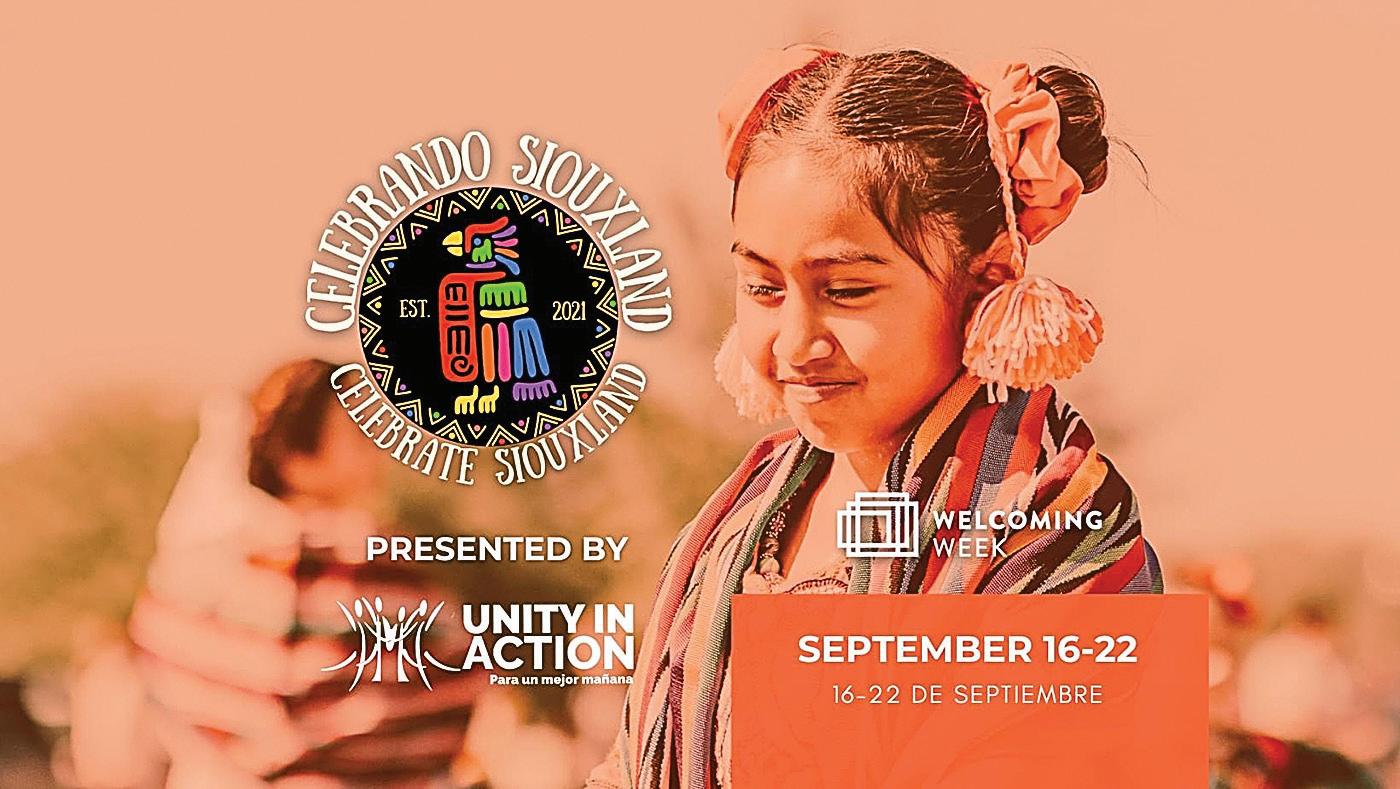
envenida, que comenzó como una modesta celebración del Día de la Independencia de México. “El desfile, una apreciada tradición de South Sioux desde hace más de veinte años, se ha transformado en el Desfile de Bienvenida, reflejo de la creciente diversidad e inclusividad de nuestra comunidad”, señala Guevara.
Tras el desfile, el festival ofrecerá una proyección especial de la película de animación Migration. Se eligió esta conmovedora película porque encaja perfectamente con el mensaje de hospitalidad y pertenencia del festival. Guevara subraya que la película “abarca el tema de la migración, centrándose en superar los miedos y aceptar el mundo y sus oportunidades”. La película y el festival ponen de relieve la importancia de abrirse a nuevas experiencias y culturas, tema central de Celebrando Siouxland.
Nuevos eventos y tradiciones duraderas
El Festival Celebrando Siouxland 2024 introduce varias actividades nuevas y emocionantes, entre las que se incluye el Immigrant Business Tours, que dará comienzo al festival el lunes 16 de septiembre. Se pondrá de relieve el espíritu empresarial de la comunidad inmigrante a lo largo de la avenida Dakota en South Sioux City, NE. Otro evento nuevo es “History at High Noon”, programado para el jueves 19 de septiembre en el Museo Público de Sioux City, Iowa. Este acto rendirá homenaje a más de 100 años de contribuciones sociales, económicas y culturales de las latinas/os de la zona. Por último, la marcha Healthy Minds (Mentes sanas), que se celebrará el sábado 21 de septiembre en colaboración con Heartland Counseling, contribuirá a desestigmatizar la salud mental en las comunidades latinas e inmigrantes. Guevara destaca la importancia de este evento, diciendo: “Este enfoque no sólo promueve la conciencia de la salud mental, sino que también fomenta un ambiente de apoyo y participación para todos los participantes.”
Un festival para todos
El impacto de Celebrando Siouxland va más allá de la celebración cultural; también tiene un importante impacto económico en South Sioux City y sus comunidades vecinas. Con más de 6,000 asistentes el año pasado, el festival está preparado para atraer a un mayor número este año.

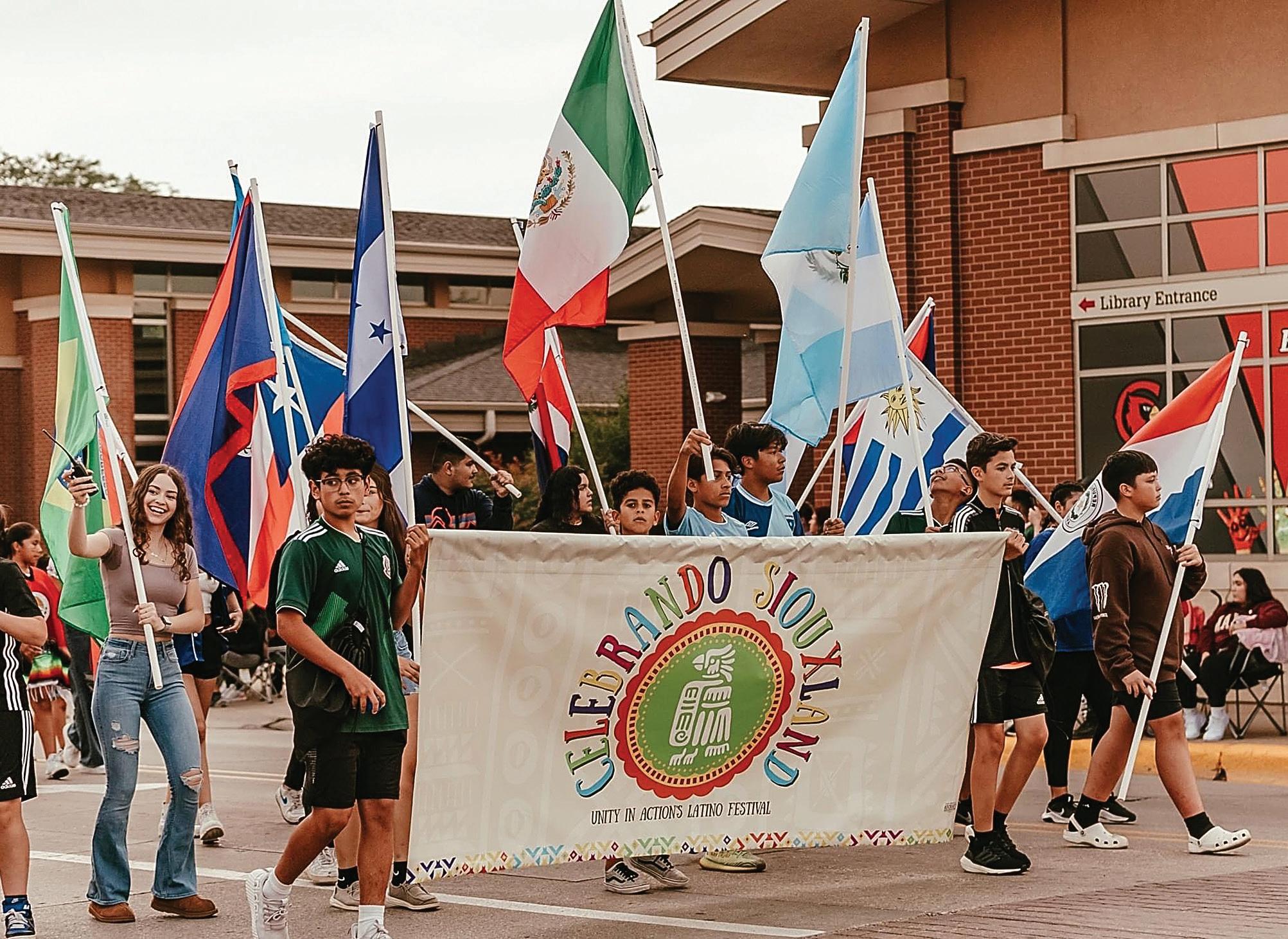
Continúa de la página anterior
“Esta acogedora iniciativa beneficia a todos: los negocios crecen, la comunidad adquiere mayor visibilidad y, colectivamente, fomentamos un entorno más integrador y de mayor pertenencia”, explica Guevara. De cara al futuro, Guevara prevé que Celebrando Siouxland se convierta en una apreciada tradición que conecte generaciones, con mayores inversiones económicas y asociaciones reforzadas. El éxito del festival se basa en el profundo compromiso de la comunidad y el apoyo de patrocinadores y socios que son cruciales para su sostenibilidad a largo plazo. Guevara expresa su
orgullo por el evento, señalando: “Estamos orgullosos de liderar esta iniciativa junto a nuestros valiosos aliados, unidos en nuestra misión de mantener viva esta tradición.”
Mientras Celebrando Siouxland siga creciendo y evolucionando, seguirá siendo un poderoso testimonio de la fuerza de la comunidad y de la rica diversidad cultural que define a Siouxland. Guevara invita a todos a unirse a la celebración asistiendo a los eventos, apoyando a los negocios participantes o simplemente adoptando el espíritu de inclusividad que representa el festival.
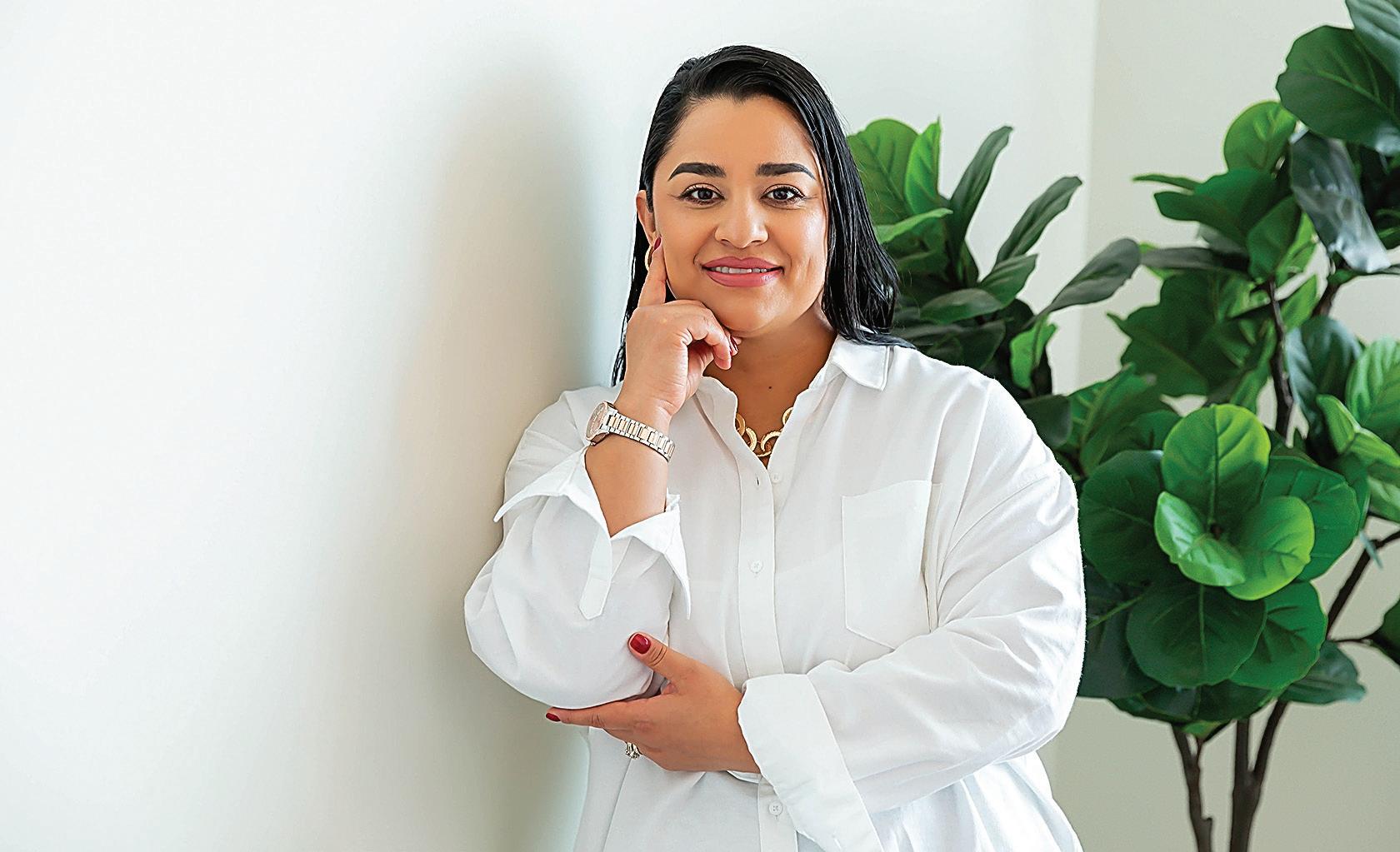
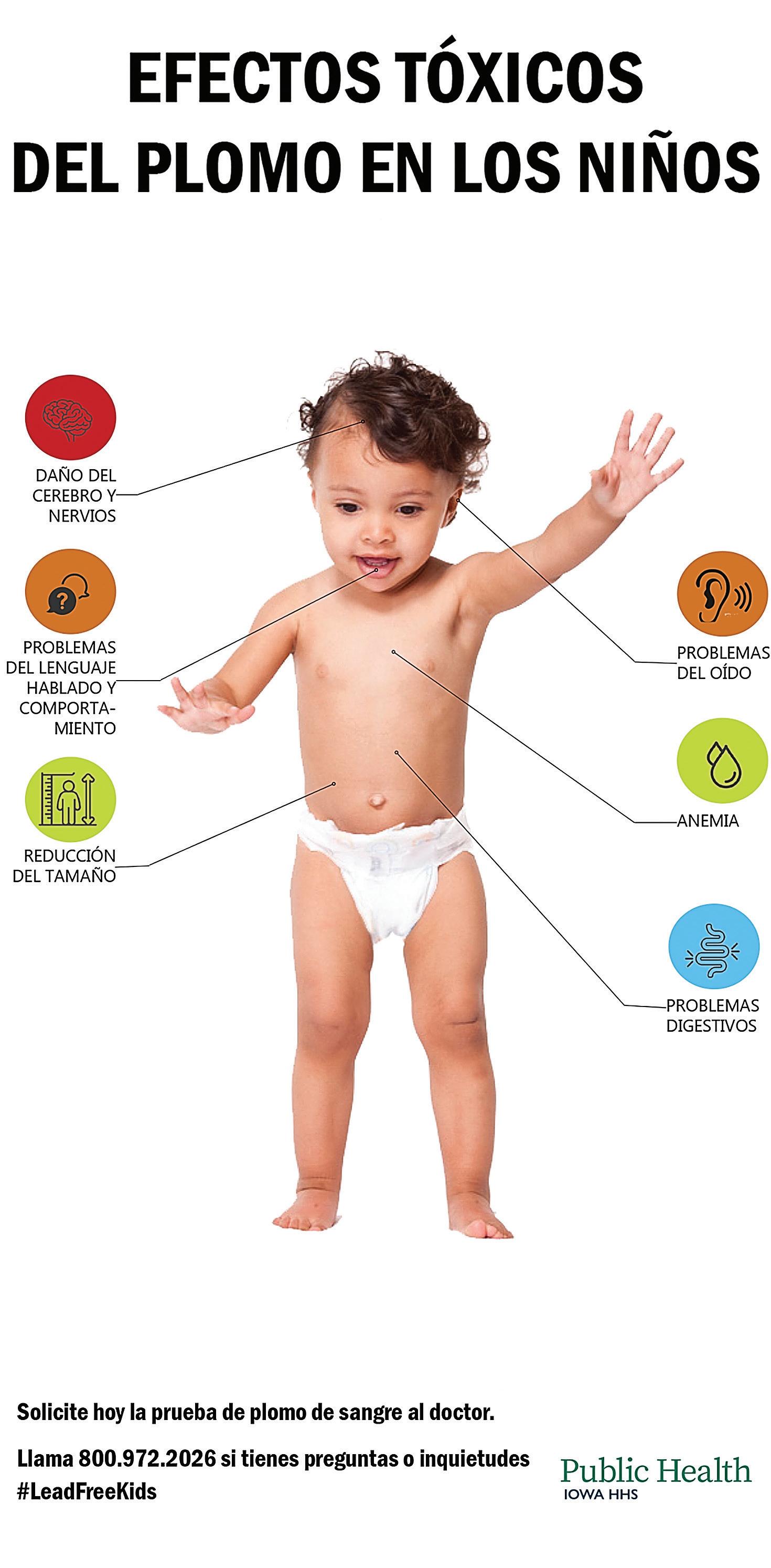


Por Christina Fernández-Morrow, Hola Iowa
Aracely Cerón de Calderón está viviendo su momento. Ha criado a tres graduados universitarios, ha formado un hogar en Des Moines y acaba de completar su certificación para ser entrenadora de salud y nutrición. “Me motivó mi propio viaje de salud que
comenzó hace 5 años. Tuve un desequilibrio hormonal que me afectó de forma muy drástica. Caí en un estado de depresión y ansiedad. Lo superé haciendo cambios en mi dieta, actividad física y bajando mis niveles de estrés”, cuenta Calderón. “No tenía energía. Estaba cansado todo el tiempo. Mi cuerpo estaba inflamado. Todo esto aumentaba mi estrés y afectaba no sólo a mi bien-

estar físico, sino también emocional y espiritual.” Los síntomas de la menopausia estaban mermando su calidad de vida. Tras huir de El Salvador en 2005 en busca de una vida más pacífica en la que su familia pudiera prosperar, no le resultaba extraño enfrentarse a los retos. Empezó poco a poco, incorporando más alimentos completos y vitaminas a su dieta. Empezó a caminar a diario, incluso cuando sólo podía hacerlo unos minutos al día. Cuando empezó a sentirse mejor, compartió consejos con otras personas que tenían problemas de salud similares. “A medida que me recuperaba, se me ocurrió la idea de compartir mis resultados con otras personas de la comunidad, especialmente con aquellas que necesitan pequeños pasos para empezar. Se pueden obtener resultados significativos en la salud general haciendo pequeños cambios. Por ejemplo, sustituyendo los alimentos ultraprocesados por productos de grano entero y eliminando las bebidas azucaradas.”
Con el tiempo, Calderón añadió la meditación diaria a su jornada. La respiración y la relajación le ayudaron a tener claridad a lo largo del día y a centrarse en tomar mejores decisiones sobre su salud. Pero sabía que podía hacer más. “Me pasé un año buscando programas y escuelas con planes de estudios que se ajustaran a mis necesidades y a lo que yo quería hacer. Encontré el Instituto de Nutrición Integrada de Nueva York”. Se matriculó en su programa de coaching de salud y pasó un año haciendo cursos online impartidos por médicos, dietistas y nutricionistas. Dedicaba las tardes a los deberes, los proyectos y los exámenes. Aprender de los expertos elevó su confianza, le enseñó nuevos métodos y herramientas para ampliar sus conocimientos a la hora de evaluar las necesidades de los clientes y diseñar planes personalizados de mejora de la salud. “No hay dos seres humanos iguales. Lo que funciona para uno puede no funcionar para otro. Tenemos que conocer
nuestro cuerpo, escuchar lo que nos pide. Tengo algunos clientes que no saben cómo les afecta estar deshidratados. Se sienten cansados, les duele la cabeza. Toman pastillas para el dolor, pero éste no cesa. Les pregunto cuánta agua beben. Parece sencillo, pero tiene un impacto enorme en nuestra vida diaria”.
Calderón tenía tantas ganas de compartir lo que estaba aprendiendo que empezó a solicitar clientes en cuanto obtuvo su primer certificado, incluso mientras seguía matriculada en los cursos. “En El Salvador estudiaba magisterio, pero con el traslado a Estados Unidos y la crianza de mis hijos, lo dejé a un lado. La carrera profesional siempre estuvo en mi mente. Sabía que tenía que volver a la educación. Me estoy reinventando. Voy a cumplir 52 años y me dije: ‘Este es mi momento’. Esta profesión es tan importante para mí porque aprovechar lo que aprendo para ayudar a transformar a otras personas para que vivan más sanas se ha convertido en mi pasión”. Esto quedó claro en la emoción de su voz cuando describió cómo aprender a construir un plato de colores para abordar los nutrientes y cómo utilizar la bio-individualidad para respetar la singularidad de nuestro cuerpo. Empezó a informar a familiares y amigos sobre su nuevo enfoque y a ofrecerles ideas para llevar una vida más sana. De esas conversaciones surgieron sus primeros clientes y, a partir de ahí, su negocio ha crecido gracias a la recomendación de boca en boca. “Tengo clientes que hacen distintos tipos de dietas y obtienen resultados positivos durante poco tiempo, pero luego vuelven a los viejos hábitos, sintiéndose más frustrados y abrumados por no alcanzar los objetivos deseados. Esto les provoca un mayor estrés. Quiero ayudar a la gente a conseguir sus objetivos de forma sostenible”.
Ella está desarrollando su negocio,


Plena Vida con la ayuda de sus tres hijos que ayudan con la administración del negocio, marketing, diseño gráfico y tecnología. Su objetivo es aumentar su clientela individual, impartir seminarios y talleres en persona y en línea, y convertirse en una entrenadora de salud y nutrición de confianza en la comunidad. A largo plazo, espera escribir un libro. “El acceso puede ser difícil, así que quiero poner mis programas al alcance de más gente”, dice Calderón. “Quiero ayudar a mi comunidad a alcanzar sus objetivos de salud a través de la nutrición integrativa”. La nutrición integrativa tiene en cuenta el entorno, la profesión, las relaciones, la espiritualidad, la vida social, las finanzas, la educación y la salud física a la hora de determinar qué es lo mejor para la salud y la dieta, con el fin de ofrecer un asesoramiento individualizado. Esa filosofía es la que le llevó a dar nombre a su negocio. Plena Vida significa una vida plena; sentirse equilibrado emocional, espiritual, mental y físicamente. “A veces sentimos que el propósito de nuestra vida se acaba cuando cumplimos 50 años, especialmente las mu-
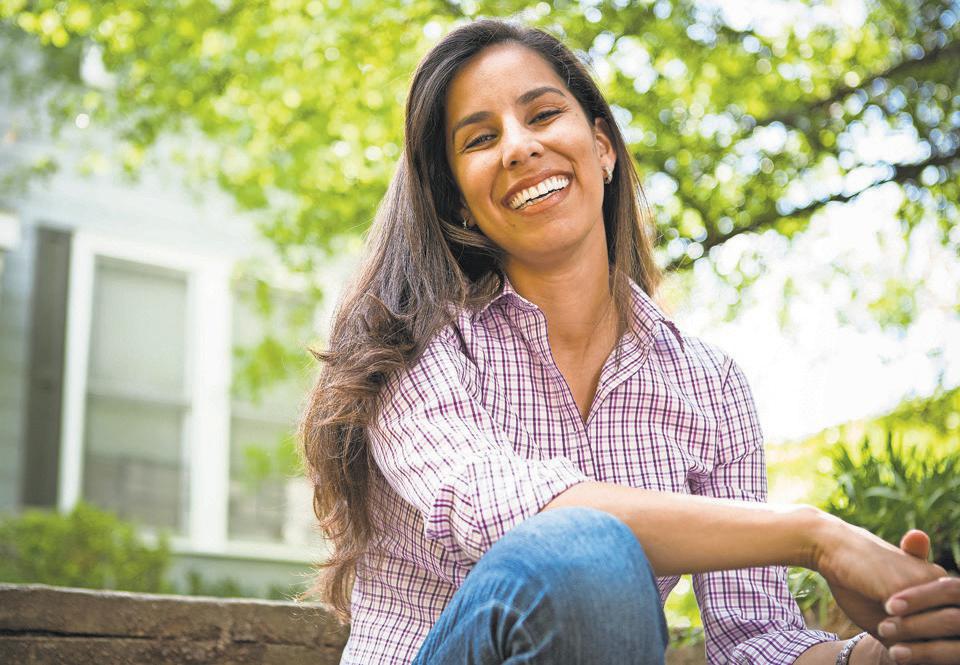
Las vacunas son la mejor opción para la prevención
jeres. Quiero que sepan que aún están a tiempo de vivir una vida plena. Si has hecho una pausa en tu vida antes de cumplir tus objetivos o tienes algunos en los que has estado trabajando y sientes que nunca los alcanzarás, quizá sea el momento de hacerte la misma pregunta que yo me hice. ¿Cómo quiero sentirme? Si quieres sentirte pleno, no importa tu edad. Si es tu momento de reinventarte, ¡hazlo!”.
Sigue a la revista JEFAS Latinas in Business en Instagram y TikTok @JEFASMagazine para obtener actualizaciones y eventos.
Usted puede encontrar la revista digital aquí:
Las vacunas protegen. 1. 3 important things to know about childhood vaccines
Las vacunas no solo te protegen a ti mismo sino también a tus amigos, familiares y comunidades.
Las vacunas son seguras. 2.
Most childhood vaccines are 90% to 99% effective in preventing diseases and have saved millions of children’s lives.
Protect your kids. Talk to their healthcare provider about getting your child vaccinated. 1. 2. 3. Vac cines work.
Estados Unidos tiene el suministro de vacunas más seguro y eficaz.
Vaccines are safe.
Las vacunas no son sólo para niños. 3.
Vaccines are thoroughly reviewed and tested before being recommended.
Vaccines protect.
Vaccines help protect against serious diseases by strengthening your child’s immune system.

Con el tiempo, la protección de las vacunas infantiles puede desaparecer, dejando a los adultos en riesgo de contraer enfermedades.
Hable hoy con su proveedor de atención médica sobre las vacunas.
hhs.iowa.gov/immtb/immunization/vfc



Por Brianne Pfannenstiel y Stephen Gruber-Miller, Des Moines Register
El Departamento de Policía de Hampton ha detenido a un hombre de 38 años que, según creen, fabricó carteles racistas y los colocó en negocios locales de propietarios hispanos.
Daniel Embree, de Hampton, está acusado de ocho cargos de acoso en segundo grado por presuntamente colocar impresiones de papel en las puertas de varios negocios. Los carteles decían “Permiso de caza para inmigrantes ilegales. Sin límite de piezas. No se requiere identificación. Trump 2024”.
La policía dice que imágenes de vigilancia de negocios cercanos conectaron a Embree con los volantes, según documentos judiciales. Las autoridades también encontraron “documentación que demuestra que estaba fabricando los volantes que puso en los negocios” en su lugar de residencia. Las autoridades determinaron que Embree presuntamente colocó los volantes en negocios hispanos “previamente seleccionados”, según la denuncia penal.
La audiencia preliminar de Embree está fijada para el jueves 22 de agosto. Está detenido bajo fianza de 5,000 dólares.

La policía de Hampton comenzó a investigar después de que esta semana se pegaran carteles racistas en varios negocios de propiedad hispana en la ciudad del centro-norte de Iowa.
El incidente fue reportado por primera vez por el Hampton Chronicle.
“Se informó al Departamento de Policía de Hampton que en las primeras horas de la mañana del martes 13 de agosto de 2024, se colocaron varios volantes en las puertas de varios negocios hispanos en Hampton”, dijo el jefe de policía de Hampton, Mark Morrison, en un comunicado. “Estamos tomando este asunto muy en serio y estamos trabajando diligentemente para identificar al individuo o individuos responsables”.
Dijo que una vez completada la investigación, el caso será remitido al fiscal del condado de Franklin. La oficina del fiscal del condado no quiso hacer comentarios mientras se investiga el caso.
Hampton, sede del condado de Franklin, está a unos 95 kilómetros al norte de Des Moines y tiene una población de 4,300 habitantes.
Las autoridades locales condenan el “crimen de odio”
Larry Sailer, presidente del Partido Republicano del condado de Franklin, dijo que considera el hecho como un delito de odio. Dijo que condena el sentimiento en los carteles y no cree que reflejen las opiniones de los republicanos o del candidato presidencial republicano Donald Trump.
“Desde luego, no es nada para promocionar a Trump o al Partido Republicano. Hace justo lo contrario”, dijo. “Solo quería asegurarme de que todos sepan que no es así como pensamos en cuanto al Partido Republicano en el condado de Franklin”.
Dijo que fue a Mi Tierra, uno de los negocios afectados, para almorzar el miércoles con el fin de mostrar su apoyo a los propietarios y se alegró de ver un comedor lleno. “Sé que la policía de la ciudad está haciendo todo lo posible para encontrar a esta persona”, dijo. “Espero que lo lleven ante la justicia. Está totalmente fuera de lugar. No necesitamos división. Tenemos que trabajar juntos. Y la gente aquí que tiene negocios que son restaurantes mexicanos, son gente trabajadora. Tienen sus corazones en el lugar correcto. Son gente de familia. Fue totalmente inapropiado. No está bien”.
El personal de Mi Tierra dijo que los propietarios del restaurante vieron el cartel en su edificio el martes por la noche y que la policía local vino al restaurante el miércoles para hablar con ellos al respecto. El miércoles el negocio estuvo bien, dijeron.
Sailer dijo que no culpa a Trump ni a su retórica por lo que se publicó en Hampton.
“Nunca he entendido que esto sea parte de lo que él está hablando”, dijo Sailer. “Por supuesto, como republicanos, ya sabes, estamos totalmente a favor de la inmigración legal. Quiero decir, eso es lo que construyó este país. Estamos totalmente a favor”.
Rita Hart, presidenta del Partido Demócrata de Iowa, denunció los carteles, diciendo que es impactante y decepcionante ver “ese tipo de discurso de odio.”
“Es estremecedor ver que alguien se siente cómodo colocando un panfleto que habla de cazar personas, que reduce a los seres humanos al mismo nivel que los animales”, dijo.
“Espero que la gente se una en torno a la idea de que ya basta, de que no estamos contentos con este tipo de retórica de odio y de que la gente tiene que levantarse y decir: ‘No, no vamos a aceptar esto’“, añadió. “Sobre todo porque hace que la gente se sienta insegura”.



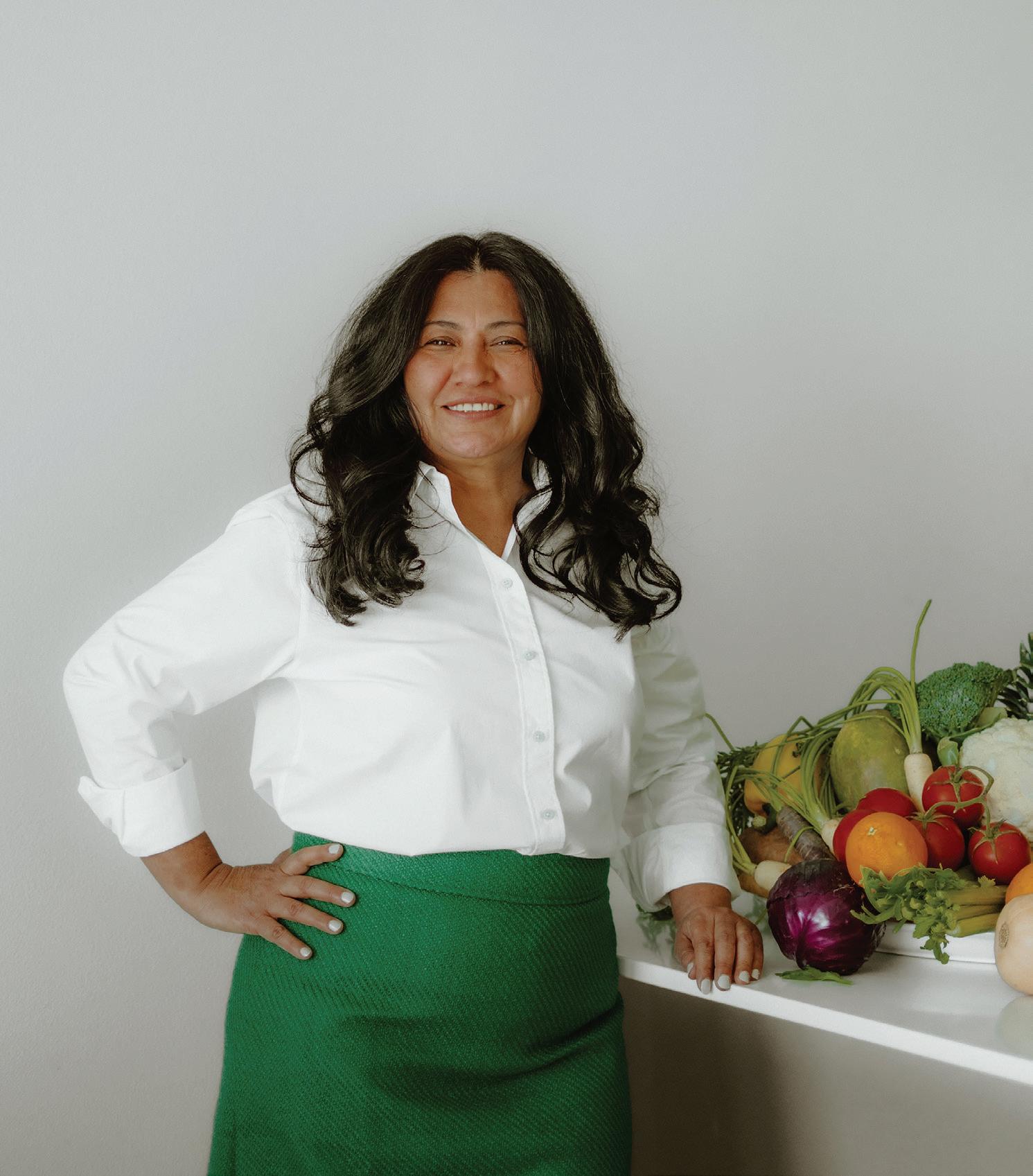
By Christina Fernández-Morrow, Hola Iowa
Aracely Cerón de Calderón is having a moment. She has raised three college graduates, made a home in Des Moines, and has just completed her certification to be a health and nutrition coach. “I was motivated by my own health journey that started 5 years ago. I had a hormonal imbalance that affected me in a very drastic way. I fell into a state of depression and anxiety. I overcame it by making changes in my diet, physical activity and lowering my stress levels,” says Calderon. “I had no energy. I was tired all the time. My body was inflamed. All of this increased my stress and affected not only my physical well-being, but emotional and spiritual as well.” Her
menopause symptoms were cutting into her quality of life. Having fled El Salvador in 2005 for a more peaceful life where her family could thrive, she was no stranger to facing challenges head-on. She started small, incorporating more whole foods and vitamins into her diet. She began walking daily, even when all she could handle was a few minutes a day. When she began to feel better, she shared advice with others who had similar health concerns. “As I recovered, I had the idea of sharing my results with others in the community, especially those who need baby steps to get started. You can have significant results in overall health by making small changes. For example, replacing ultra-processed foods with whole grains and eliminating sugary beverages.”
Over time, Calderon added daily meditation to her day. The breathing and slowing down helped her have clarity throughout the day and helped keep her focused on making better health decisions. But she knew there was more she could do. “I spent a year researching programs and schools with curriculums that matched my needs and what I wanted to do. I found the Institute of Integrated Nutrition in New York.” She enrolled in their health coaching program and spent a year taking online courses taught by physicians, dieticians, and nutritionists. Her evenings were dedicated to homework, projects, and exams. Learning from experts elevated her confidence, taught her new methods and tools to expand her knowledge when assessing client needs and designing personalized health improvement plans. “No two humans are alike. What works for one may not work for another. We have to get to know our bodies, listen to what they are asking of us. I have some clients who don’t know how being dehydrated impacts their day. They feel tired, get headaches. They take pills for the pain, but it doesn’t stop. I ask how much water they drink. It sounds simple but it has a huge impact on our daily lives.” Calderon was so eager to share what she was learning, she began soliciting clients as soon as she got her first certificate, even as she was still enrolled in courses. “In El Salvador I was training to be a teacher but with our move to the US and raising my kids, that was put on hold. A career was always in the back of my mind. I knew I had to return to education. I am reinventing myself. I will be 52 years old and I said, ‘This is my moment.’ This profession is so important to me because using what I learn to help transform other people to live healthier lives has become my passion.” This was clear in the excitement in her voice as she described learning about building a colorful plate to address nutrients, and how to use bio-individuality to honor our body’s uniqueness. She began informing family and friends about her new focus and offering them ideas for healthier lives. Those conversations led to her first clients and her business has grown from there through word of mouth. “I have clients who do different types of diets and have positive results for a short time but then they go back to old habits, feeling more frustrated and overwhelmed by not achieving their de-
sired goals. It causes greater stress. I want to help people achieve their goals in sustainable ways.”
She is developing her business, Plena Vida with the help of her three children who help with business administration, marketing, graphic design, and technology. Her goal is to grow her one-on-one clientele, lead inperson and online seminars and workshops, and become a trusted health and nutrition coach in the community. In the long-term, she hopes to write a book. “Access can be difficult, so I want to make my programs available to more people,” says Calderon. “I want to help my community reach their health goals through integrative nutrition.” Integrative nutrition looks at environment, career, relationships, spirituality, social life, finances, education, and physical health when determining what’s best for your health and diet to provide individualized coaching. That philosophy is what led to naming her business. Plena Vida means a full life; to feel balanced emotionally, spiritually, mentally, and physically. “Sometimes we feel like our life’s purpose is over when we turn 50, especially women. I want them to know they still have time to live full lives. If you paused your life before meeting your goals or have some you have been working on and feel like you’ll never reach them, maybe it’s time to ask yourself the same question I did. How do I want to feel? If you want to feel whole, it doesn’t matter your age. If it’s your time to reinvent yourself, do it!”
Follow JEFAS Latinas in Business magazine on Instagram and TikTok @JEFASMagazine for updates and events.
You can find the digital magazine here:

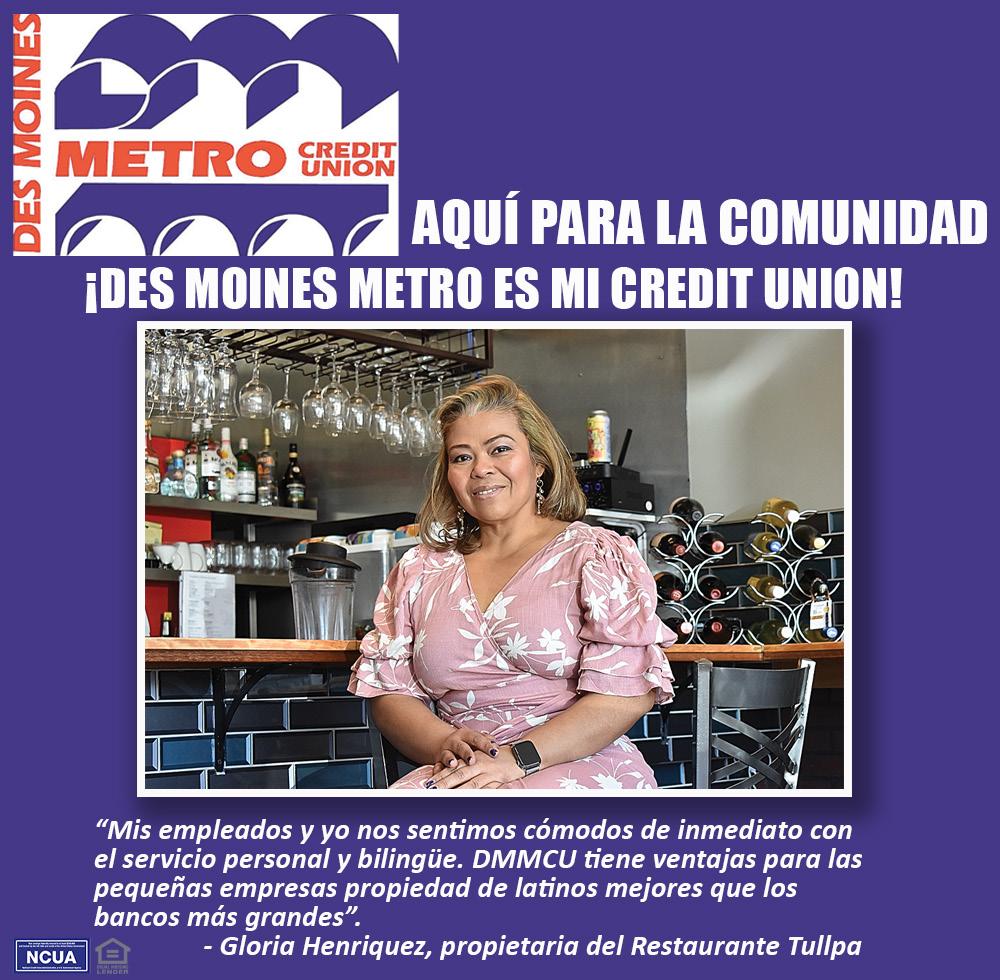
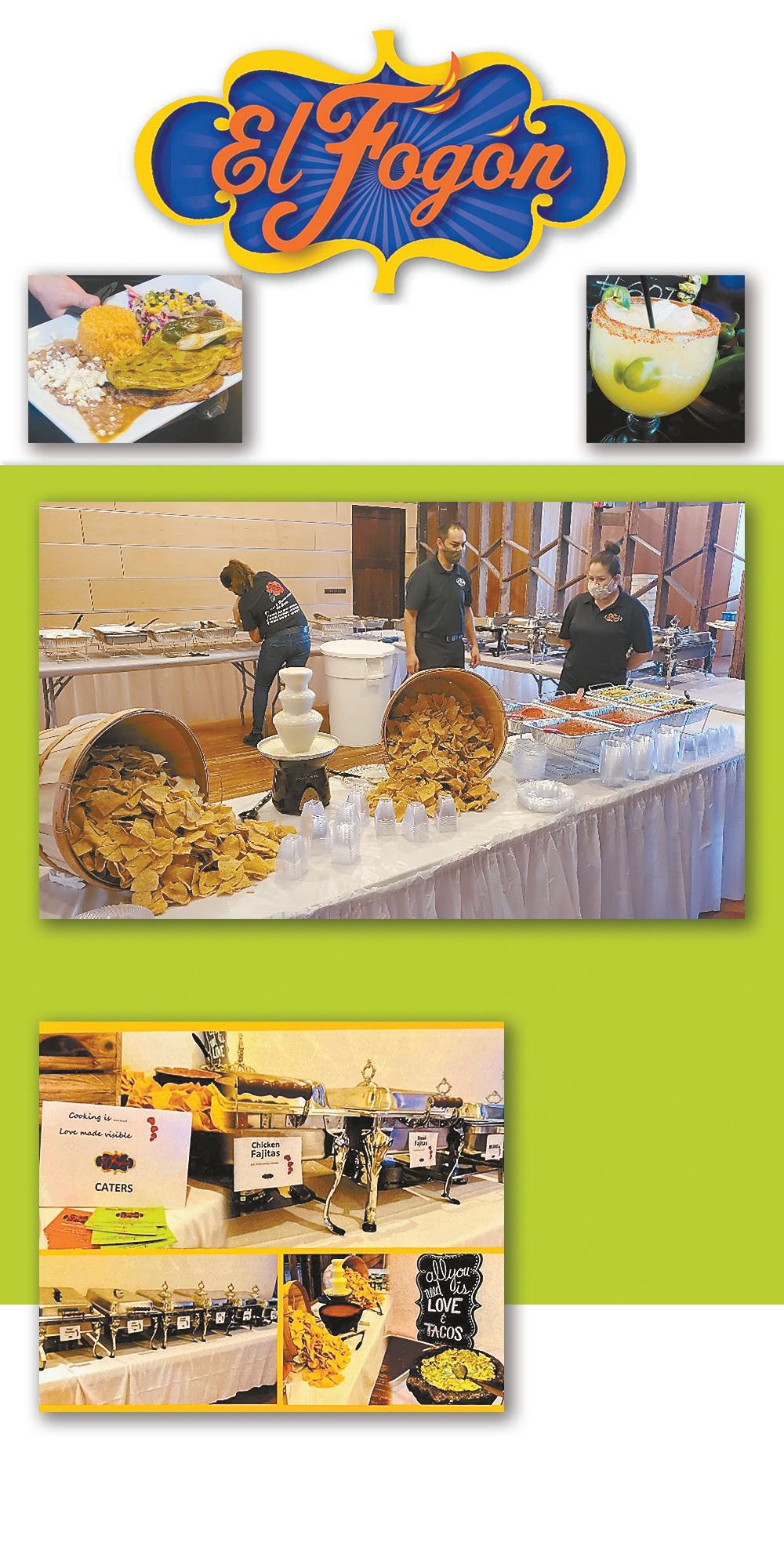



By F. Amanda Tugade, Des Moines Register
Part of a series for the Des Moines Register’s 175th anniversary that examines Iowa’s past and future demographics.
Gabby Guerra stood by the entrance of Jewett Hall on a recent Sunday afternoon, greeting the dozens of Latino families who came from all over Iowa to Drake University’s campus. Even the intense heat was no match for Guerra’s cheery voice and big smile as she welcomed parents and students armed with duffle bags, suitcases, fuzzy blankets and pillows.
“Pasen, pasen,” Guerra said in Spanish, directing the groups to the lobby, where they met her colleagues from Al Éxito and Drake students who handed them giveaways before helping them settle in dorms.
July 14 kicked off the first day of the nonprofit’s annual summer camp, Al Éxito University, a free, four-day event geared toward Latino high school students who are on the path to be the first in their families to attend college. Parents that day attended bilingual workshops with their teens to learn more about applying for college and financial aid, building a support system and working with teachers and counselors to prepare for those next steps.
The Latino community in Iowa is essential to the state’s growth — it has grown more than 13-fold since 1969 to 7% of Iowa’s population and is projected to more than double to 408,000 people by 2050, according to the Iowa Latinx Project. It also is the youngest of Iowa’s racial or ethnic groups, with a median age of 23.7 compared to 41.5 for the white population.
Which is why education has become such a touchstone for programs like Al Éxito, one of the only nonprofits in

the state working to empower Latino Iowans through education to not only find success but to strengthen Iowa’s future workforce. It’s also why community groups have fought against the state’s latest immigration law, which makes it a crime to enter Iowa for anyone with an outstanding deportation order or who previously has been removed from or denied admission to the U.S.
The law, on hold after a federal judge granted a temporary injunction in June, put Iowa immigrants on edge, igniting fears over racial profiling. Latino Iowans in Des Moines, Waterloo and other cities united in protest this summer, seeking to raise awareness of the far-reaching law that even police departments charged with enforcing it criticized.
Living in the U.S. with uncertainty is a feeling Guerra, a program director at Al Éxito, knows all too well. Nearly two decades ago, Guerra came to the U.S. from El Salvador with her parents, who wanted her and her siblings to have a better future.
Guerra said that journey can be tough, lonely and scary, especially for those who are first-generation college students.
The message during the Al Éxito University welcome event was reminiscent of the one that poured from this summer’s marches: “No están solo”: You are not alone. Al Éxito University seeks to show Latinos are ‘powerful’ Before the families dispersed for campus tours, Alejandro Hernandez shared what his father told him after he became the first Latino dean at Drake: “We cannot be looked down upon.” Hernandez, who leads the Zimpleman College of Business, said he understood that meant to have humility and to recognize the role is more than a title.
“We are incredibly powerful,” he told the crowd of more than 80 teens and their families. “We have so much to contribute.”
In Iowa, Latinos make up about 7% — or 221,805 — of the state’s population. By 2060, the Iowa Latino population is expected to reach nearly 518,000, according to a report last year by the State Data Center of Iowa. In 2022, 75% of Iowa Latinos over the age of 16 were in the labor force, compared with 67% of all Iowans 16 and older. Latino workers primarily took on jobs in transportation, production, business, management and service, the data center reported.
Recent findings from the Iowa Latinx Project say Latinos own 4,695 businesses in the state, and they generate $1 billion in annual revenue. And the 106,000 Latino workers in Iowa collectively earn $4.8 billion in annual income. But both reports also highlight disparities, especially in education. While 93% of Iowans 25 and older have at least a high school education, the figure drops to 70% for Latino Iowans, according to the State Data Center. And while 32% of Iowans 25 and older have at least a bach-
Continues in next page

Continues from last page
elor’s degree, just 16% of Latino Iowans do. Latinos continue to remain underrepresented in colleges and universities.
Lack of educational resources and bilingual programs for children and parents are examples of issues hindering students’ success, the Latinx Project found.
For Guerra and colleague Andres Lomeli Cervantes, their work through Al Éxito is personal, driven by their desire to help the next generation of students. They, along with other program leaders, know the barriers students and immigrant families face in getting a higher education. Immigration status, lack of money, language difficulties and absence of a support system are common challenges that make it harder to take the next step, they say.
“I questioned my place at the university — whether I belong there at all,” Cervantes, 19 and a rising sophomore at the University of Northern Iowa, told the audience about his first year in college. “I remember sitting in my dorm feeling isolated and overwhelmed, thinking of all the sacrifices my family made, the pressure. … And I often felt all the weight on my shoulders.”
That moment in his dorm room was just part of the story. Prior to arriving at UNI, Cervantes said, he was on track to receive a full ride scholarship for an online institution. It was the chance of a lifetime for the Marshalltown native, who was working three jobs to save up for college. Cervantes said the opportunity fell through at the last minute, but he found refuge in Al Éxito, especially in Executive Director Dawn Martinez Oropeza, who supported him and helped him get to UNI.
As Cervantes opened up about his freshman year, he also noted other roadblocks such as switching majors, adjusting to living on a college campus and making new friends.
“The struggle does not stop there,” he said, encouraging parents and students alike to ask for help, ask questions and persevere.
‘You have a community that believes in you,’ program staffer says
Guerra, who graduated from the University of Iowa, recalled worrying about signing up for Deferred Action for Childhood Arrivals, also known as DACA, after former President Barack Obama in 2014 expanded the program, which allows undocumented people who came to the country as children to continue to live, work and study in the U.S.
“My family and I were really scared to go into a system,” Guerra, 28, told the Des Moines Register. “We were scared of what that could mean now that we became more visible to the United States government. There was a lot of fear filling out that first application because now they had everything of yours, but we decided to take the risk.
“We felt like if this is going to give you the opportunity to go to get an education, then we’re going to do that.”
September 5, 2024
Guerra was 7 when she and her parents came to Iowa in 2002 from El Salvador. She was the first among her siblings to arrive and still remembers how her parents explained their nearly 3,000-mile move.
“They told me that I was coming here so I could get an education,” Guerra said. She said she knew even then she was undocumented, but set her sights on the goal of doing well in school.
Before the Guerras left their home country, which had long been engulfed in a civil war, it had grown increasingly violent. Poverty rates rose, and jobs and opportunities dwindled. She said her father was a migrant worker who traveled back and forth between El Salvador and the U.S., primarily in California. He took on factory and manufacturing jobs and worked in fast-food restaurants — “really, anything at that time,” she said.
Guerra’s father had a friend who settled in Utah and a relative who found a home in Iowa. He followed the advice of the relative, who saw Des Moines as a place that was safe for families and had good schools. Cervantes said his parents, likewise, emigrated to the U.S. from Mexico in the hope their children would receive a solid education.
In school, Guerra was a stellar student, and in seventh grade, she was part of an accelerated program at Central Academy. She believed, like so many, that her hard work would pay off, but later in high school, she found her immigration status to be a barrier to college and other opportunities.
“That’s when my peers started getting jobs, or internships, or professional experience. They started driving, and I couldn’t do that,” said Guerra, who went to North High School. “I couldn’t get a license. I couldn’t get a job, so I couldn’t have additional money. Volunteering, even stuff like that, I started to have some issues with.”
Guerra told the Register she navigated those obstacles by leaning on high school counselors and college advisers for help, answers and guidance with the DACA process.
“I was kind of just going in blind and literally knocking on every door possible,” she remembered. She now passes on to students the lesson she carries from that experience: “You have to be the No. 1 person looking out for yourself.”
Back at the auditorium, Cervantes continued to tell families about his freshman year. Under the stage spotlight, he walked them through the difficult moments that had led him there and also told of the people who believed in him and wouldn’t let him quit. In Spanish and English, Cervantes once more told students they can and they will.
“I want to remind you that you’re not alone,” he said. “You have a community that believes in you and is invested in your success.”
F. Amanda Tugade covers social justice issues for the Des Moines Register. Email her at ftugade@dmreg.com or follow her on Twitter @writefelissa.

OCTOBER 11, 2024 – JANUARY 19, 2025
ANNA K. MEREDITH GALLERY
OPENING CELEBRATION
THURSDAY, OCTOBER 10 | 5 – 7 PM
VISIT DESMOINESARTCENTER.ORG FOR MORE INFORMATION AND RELATED PROGRAMS
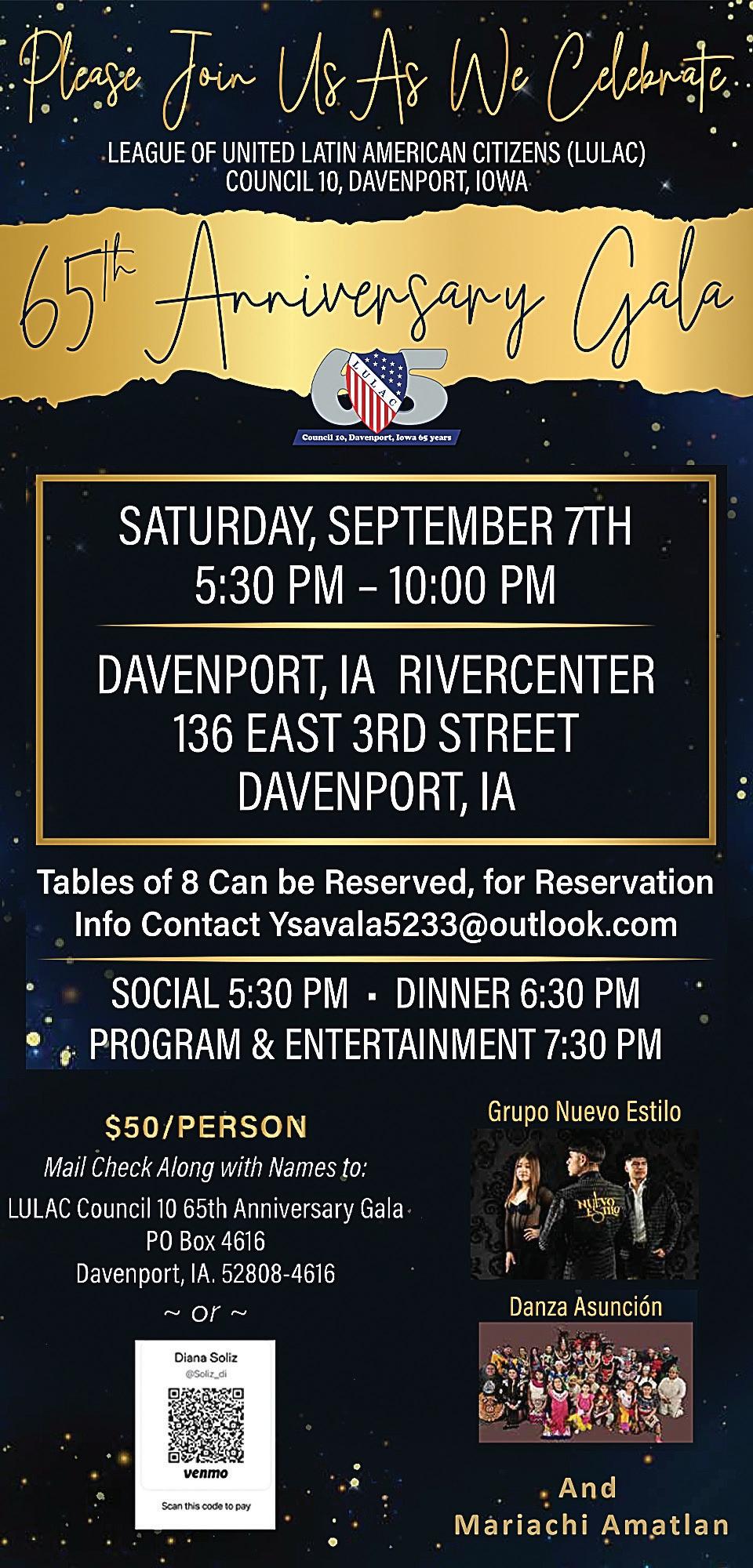











By Brianne Pfannenstiel and Stephen Gruber-Miller, Des Moines Register
The Hampton Police Department has arrested a 38-yearold man who they believe produced racist signs and attached them to local Hispanic-owned businesses.
Daniel Embree, of Hampton, is charged with eight counts of second-degree harassment for allegedly placing paper printouts on several business doors. The signs said “Illegal immigrant hunting permit. No bag limit. Tagging not required. Trump 2024.”
Police say surveillance footage from nearby businesses connected Embree to the flyers, according to court documents. Authorities also found “documentation showing he was producing the fliers he put on the businesses” at his place of residence.
Authorities determined that Embree allegedly placed the fliers on “pre-targeted” Hispanic-owned businesses, according to the criminal complaint.
Embree’s preliminary hearing is set for Thursday, Aug. 22. He is being held on $5,000 bond.
Hampton police began investigating after racist signs were taped to multiple Hispanic-owned businesses in the north-central Iowa town this week.
The incident was first reported by the Hampton Chronicle.
“It was reported to the Hampton Police Department that in the early morning hours of Tuesday, August 13, 2024, multiple fliers were placed on the doors of several Hispanic businesses in Hampton,” Hampton Police Chief Mark Morrison said in a statement. “We are taking this matter very seriously and are working diligently to identify the individual or individuals responsible.”
He said after the investigation is completed, the case will be forwarded to the Franklin County Attorney.
The county attorney’s office declined to comment while the case is under investigation.
Hampton, the Franklin County seat, is about 95 miles north of Des Moines and has a population of 4,300 residents.
Larry Sailer, chair of the Franklin County Republican Party, said he considers the act to be a hate crime. He said he condemns the sentiment on the posters and doesn’t believe they reflect the views of Republicans or Republican presidential nominee Donald Trump.
“It’s certainly nothing to promote Trump or the Republican Party. It does just the opposite,” he said. “I just wanted to make sure everybody knows that that is not how we think as far as the Republican Party in Franklin County.”
He said he went to Mi Tierra, one of the affected businesses, for lunch Wednesday to show his support to the owners and was pleased to see a packed dining room.
“I do know the city police here are doing everything they can to find this person,” he said. “Hopefully they do bring them to justice. It’s just totally uncalled for. We don’t need division. We need to work together. And the people here that have businesses that are Mexican restaurants, are hardworking people. They’ve got their hearts in the right place. They’re family people. It was just totally uncalled for. It’s just not right.”
Staff at Mi Tierra said that the restaurant’s owners saw the sign on their building Tuesday evening and that local police came by the restaurant Wednesday to speak with them about it. Business on Wednesday was good, they said.
Sailer said he does not blame Trump or his rhetoric for what was posted in Hampton.
“I’ve never understood this to be part of what he’s talking about,” Sailer said. “Of course, as Republicans, you know, we’re totally for legal immigration. I mean, that’s what built this country. We’re totally for that.”
Rita Hart, chair of the Iowa Democratic Party, denounced the signs, saying it’s shocking and disappointing to see “that type of hateful talk.”
“It’s shocking to see that somebody feels comfortable putting up a flyer that talks about hunting people, that reduces human beings to the same level as animals,” she said.
“I hope that people rally around the notion that enough is enough, that we’re not happy about this kind of hateful rhetoric and that people need to stand up and say, ‘No, we’re not going to accept this,’” she added. “Especially because it does make people feel unsafe.”




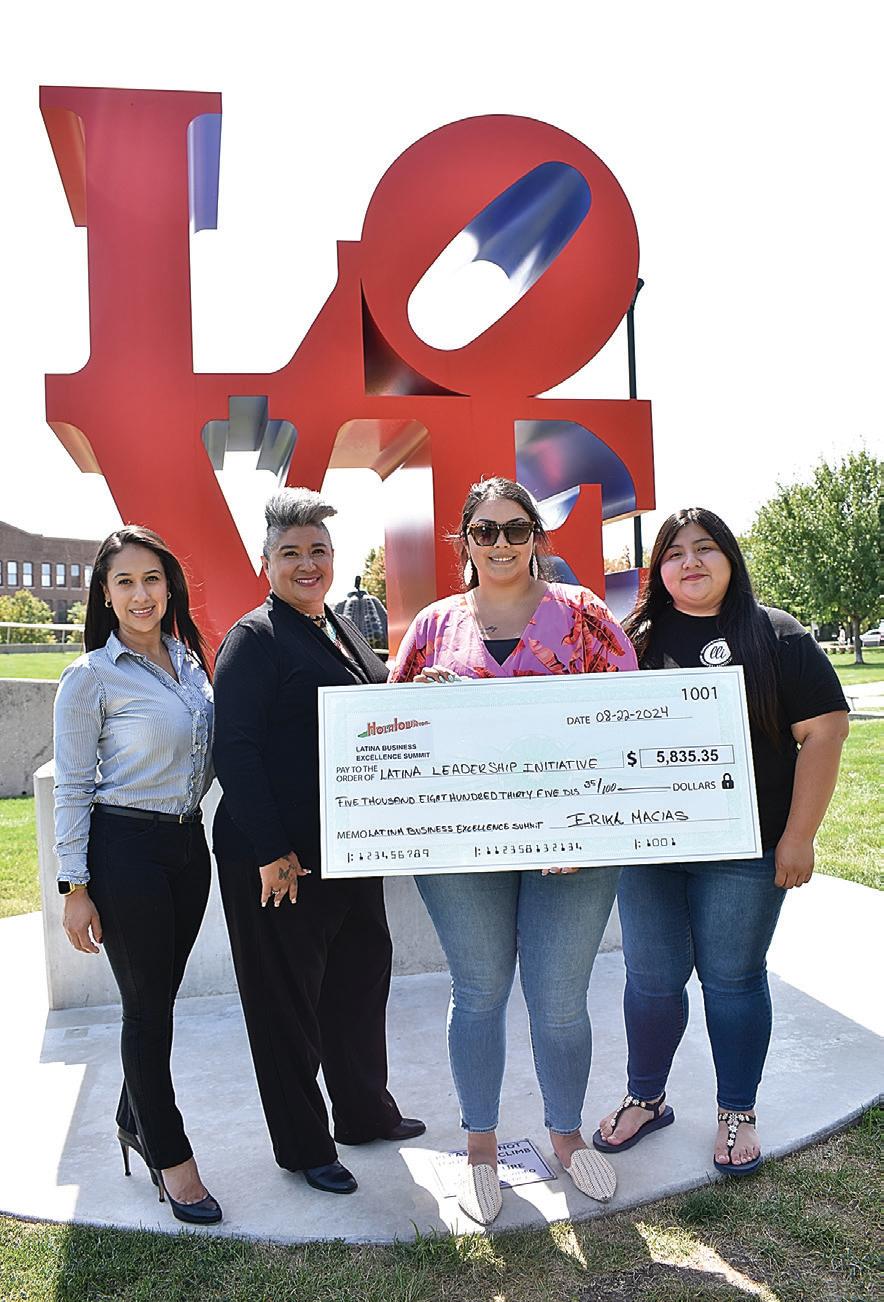
We are proud to present the Latina Leadership Initiative board with a donation of $5,835.35 from the proceeds of the Latina Business Excellence Summit that took place in May.
“We are very proud of the work LLI does for our community in preparing the next generation of Latina leaders. On behalf of the leadership team of the Latina Business Excellence Summit, I’m proud to present them with this donation” - said Erika Macias of Hola Iowa.
The Latina Leadership Initiative of Greater Des Moines (LLI) fills the gap in culturally appropriate leadership programming for Latinas. LLI cultivates social responsibility and attention to the needs of the broader community in Iowa.
Estamos orgullosos de presentar a la junta directiva de la Iniciativa de Liderazgo para Latinas una donación de $5,835.35 provenientes de las ganancias de la Cumbre de Excelencia Empresarial para Latinas que se llevó a cabo en mayo.
“Estamos muy orgullosos del trabajo que LLI hace por nuestra comunidad al preparar a la próxima generación de líderes latinas. En nombre del equipo de liderazgo de la Cumbre de Excelencia Empresarial para Latinas, estoy orgullosa de presentarles esta donación” - dijo Erika Macias, Hola Iowa.
La Iniciativa de Liderazgo Latina de Greater Des Moines (LLI) llena el vacío en la programación de liderazgo culturalmente apropiada para las latinas. LLI cultiva la responsabilidad social y la atención a las necesidades de la comunidad más amplia de Iowa.
Foto por Tar Macias / Hola Iowa
El vigésimo año del Festival Mundial de Comida y Música en el centro de Des Moines comenzó con una ceremonia de naturalización durante la cual 52 personas de todo el mundo se convirtieron en ciudadanos estadounidenses.
Los países representados durante la ceremonia fueron:
Bután
Birmania
Camerún
China
Congo (Kinshasa)
Egipto
El Salvador
Eritrea
Etiopía
Guatemala
India
Letonia
Liberia
México
Moldavia
Pakistán
Filipinas
Rusia
Sudáfrica
Sudán
Tailandia
Togo
Uganda
Ucrania
Vietnam
Fotos por Tar Macias / Hola Iowa
The 20th year of the World Food & Music Festival in Downtown Des Moines kicked off with a Naturalization Ceremony during which 52 individuals from around the world became U.S. citizens.
Countries represented during the ceremony were:
Bhutan
Burma
Cameroon
China
Congo (Kinshasa)
Egypt
El Salvador
Eritrea
Ethiopia
Guatemala
India
Latvia
Liberia
Mexico
Moldova
Pakistan
Philippines
Russia
South Africa
Sudan
Thailand
Togo
Uganda
Ukraine
Vietnam
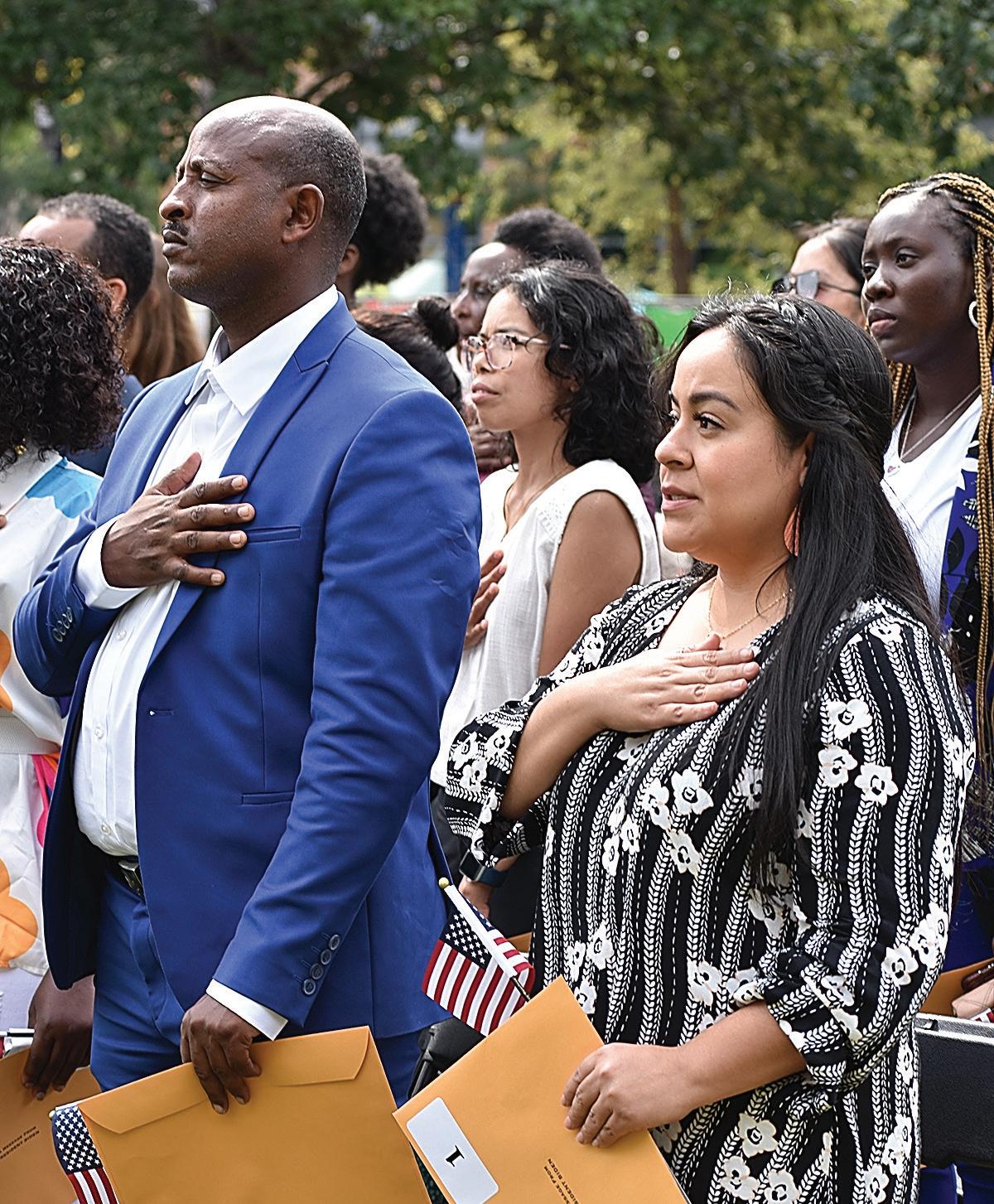


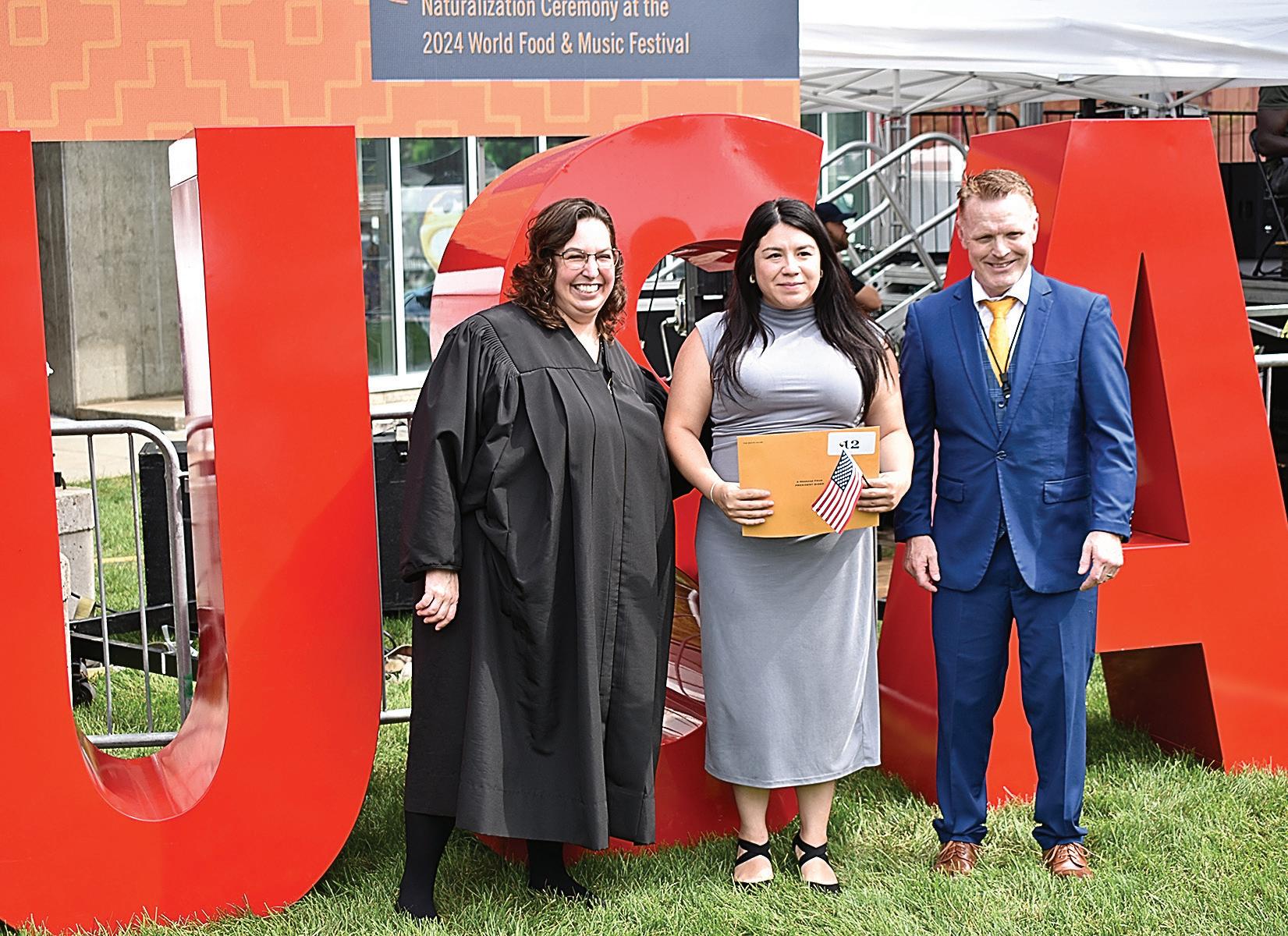
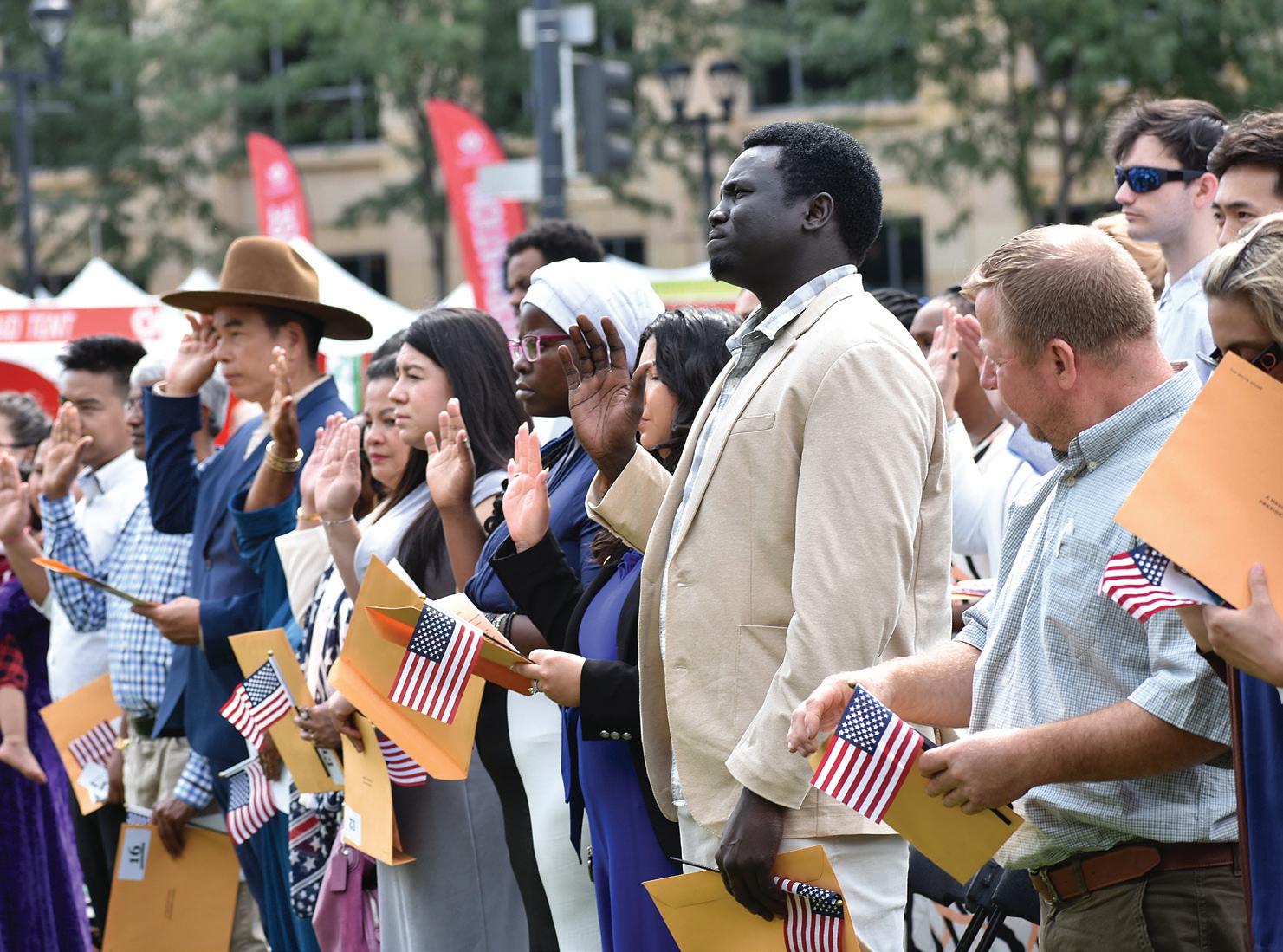
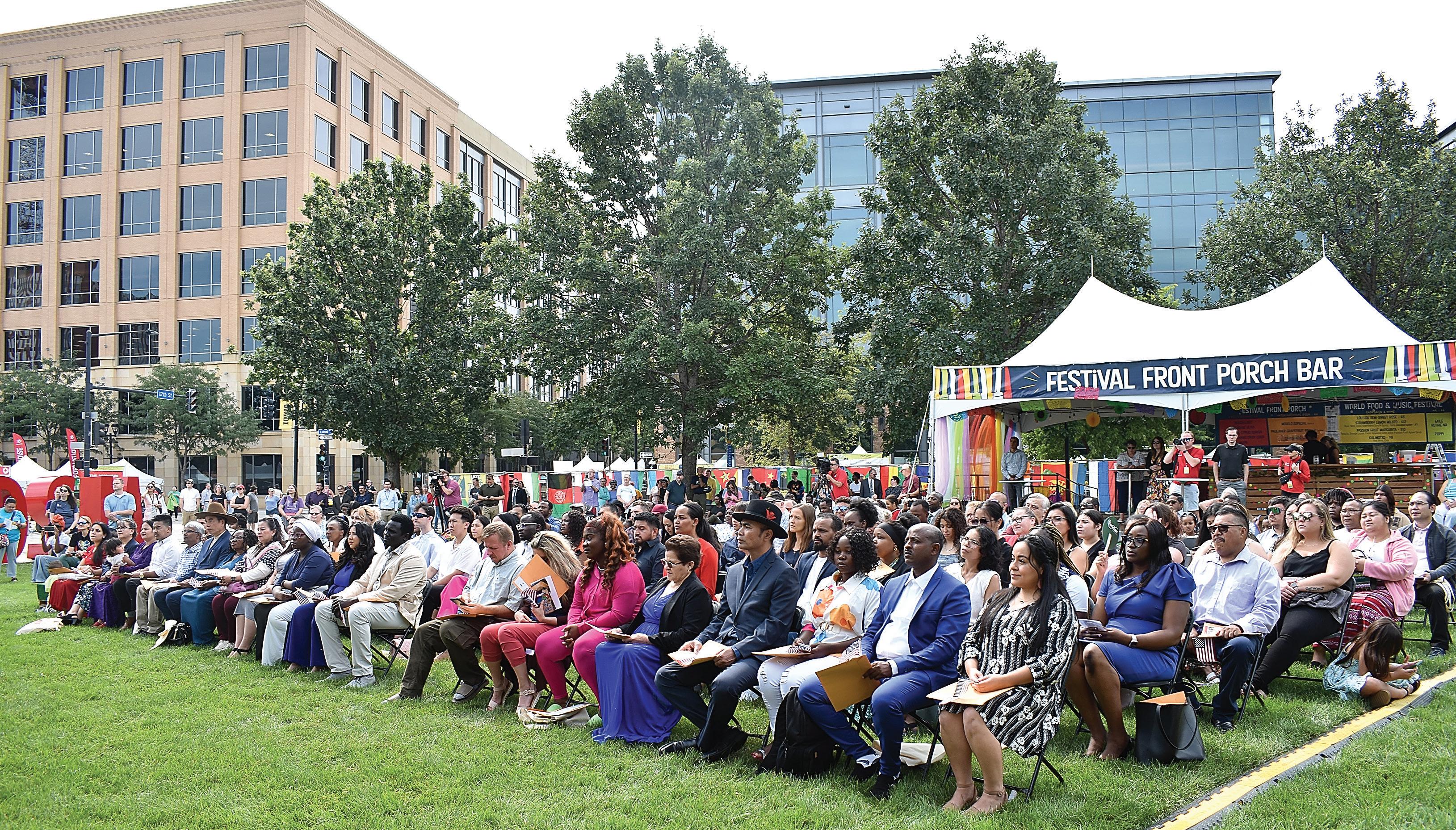







By Maya Chavez, Hola Iowa
The 2024 Celebrando Siouxland festival, taking place September 16-22, is a celebration of cultural diversity and community spirit in the Iowa, Nebraska, and South Dakota tri-state region. Olga Guevara, the Executive Director of Unity in Action of South Sioux City, Nebraska, shared insights into the origins, evolution, and future aspirations of this beloved event, which has become a significant part of the cultural calendar in the Siouxland region.
Celebrando Siouxland has its roots in the national Welcoming Week campaign, which is dedicated to fostering communities that are inclusive and welcoming to all, particularly immigrants. Unity in Action has been at the forefront of this movement, organizing events that celebrate the region’s vibrant cultural diversity. In a statement, Olga Guevara shares, “What began as a modest block party in 2019 has blossomed into a week-long celebration under the banner ‘Celebrate Siouxland,’ where we aim to cultivate a deep sense of belonging through expressive arts, music, and culinary traditions.”
The festival’s primary goal is to build and uplift the Latino and immigrant communities in Siouxland. This mission is reflected in the variety of activities planned for the week, designed to bring people together and celebrate the rich tapestry of cultures that call Siouxland home.
The theme for this year’s festival, “Carnival,” comes from celebrations across Latin America. “Inspired by the colorful exuberance of the Mazatlán Carnival in Mexico and the grand spectacle of Rio de Janeiro’s Carnaval, we aim to bring that same energy and joy to our events,” states Guevara. Attendees can expect a lively atmosphere, elaborate props, and a celebration that embodies Latin American culture.
One of the festival’s highlights is the Welcoming Parade, which started as a modest Mexican Independence Day celebration. “The parade, a cherished South Sioux tradition for over twenty years, has transformed into the Welcoming Parade, reflecting the growing diversity and inclusivity of our community,” Guevara notes.
Following the parade, the festival will feature a special screening of the animated film Migration. This heartwarming movie was chosen because it aligns perfectly with the festival’s message of welcoming and belonging. Guevara emphasizes that the film “embraces the theme of migration, focusing on overcoming fears and embracing the
world and its opportunities.” The film and festival highlight the importance of opening oneself to new experiences and cultures, which is a central theme of Celebrando Siouxland.
The 2024 Celebrando Siouxland Festival introduces several exciting new activities, including Immigrant Business Tours, which will kick off the festival on Monday, September 16. It will spotlight the entrepreneurial spirit of the immigrant community along Dakota Avenue in South Sioux City, NE.
Another new event is “History at High Noon,” scheduled for Thursday, September 19 at the Sioux City Public Museum in Iowa. This event will honor more than 100 years of social, economic, and cultural contributions of Latina/os in the area. Lastly, the Healthy Minds Walk on Saturday, September 21, in collaboration with Heartland Counseling, will help destigmatize mental health within Latino and immigrant communities. Guevara highlights the importance of this event, saying, “This approach not only promotes mental health awareness but also fosters a supportive and engaging environment for all participants.”
The impact of Celebrando Siouxland extends beyond cultural celebration; it also has a significant economic impact on South Sioux City and its neighboring communities. With over 6,000 attendees last year, the festival is poised to attract greater numbers this year. “This welcoming initiative benefits everyone: businesses thrive, the community gains greater visibility, and we collectively foster a more inclusive and belonging environment,” Guevara explains. Looking ahead, Guevara envisions Celebrando Siouxland growing into a cherished tradition that bridges generations, with increased economic investments and strengthened partnerships. The festival’s success is rooted in the community’s deep commitment and the support of sponsors and partners that are crucial to its long-term sustainability. Guevara expresses pride in the event, noting, “We are proud to lead this initiative alongside our valued allies, united in our mission to keep this tradition alive.”
As Celebrando Siouxland continues to grow and evolve, it remains a powerful testament to the strength of community and the rich cultural diversity that defines Siouxland. Guevara invites everyone to join in the celebration by attending the events, supporting participating businesses, or simply embracing the spirit of inclusivity that the festival represents.
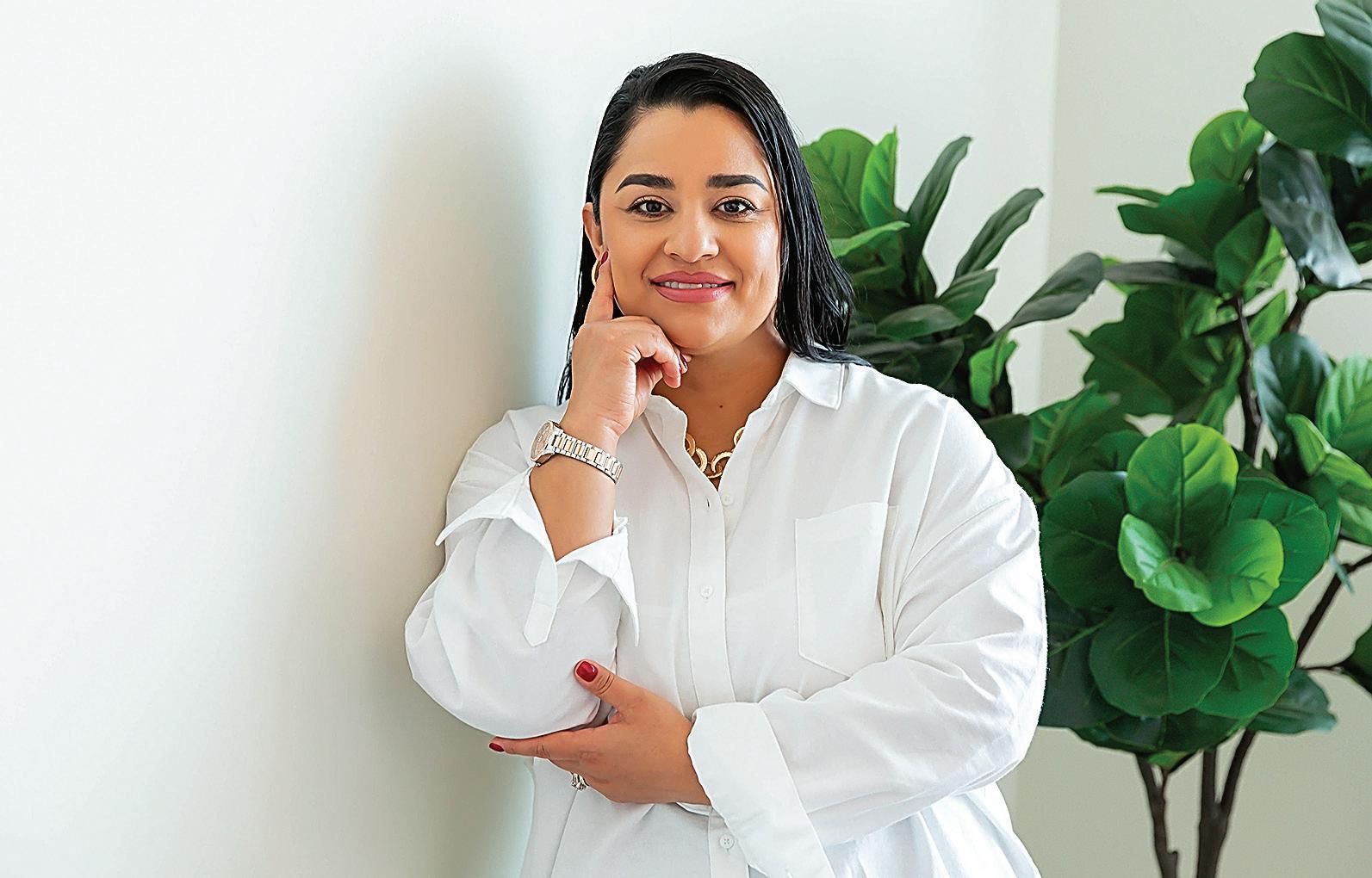

EN LAS ELECCIONES GENERALES DEL 2024
EL PRIMER DÍA PARA SOLICITAR LA BOLETA DE VOTACIÓN EN AUSENCIA POR CORREO AGOST 27
OCT 16
EL PRIMER DÍA PARA ENVIAR LAS BOLETAS DE VOTACIÓN EN AUSENCIA, PRIMER DÍA DE VOTACIÓN EN PERSONA
OCT 21 FECHA LÍMITE DE PREINSCRIPCIÓN, FECHA LÍMITE PARA SOLICITAR LA BOLETA EN AUSENCIA PARA VOTAR POR CORREO : AMBAS DEBEN DE SER SOLICITADAS ANTES DE LAS 5 PM NOV 04 ÚLTIMO DÍA PARA VOTAR EN PERSONA EN AUSENCIA NOV 05 DÍA DE ELECCIONES, LAS CASILLAS ABREN DE 7 AM - 8 PM; LA FECHA LÍMITE PARA RECIBIR LAS BOLETAS DE VOTANTES EN AUSENCIA ES A LAS 8 PM
PARA OBTENENR INFORMACION CONFIABLE
SOBRE LAS ELECIONES DE IOWA:
